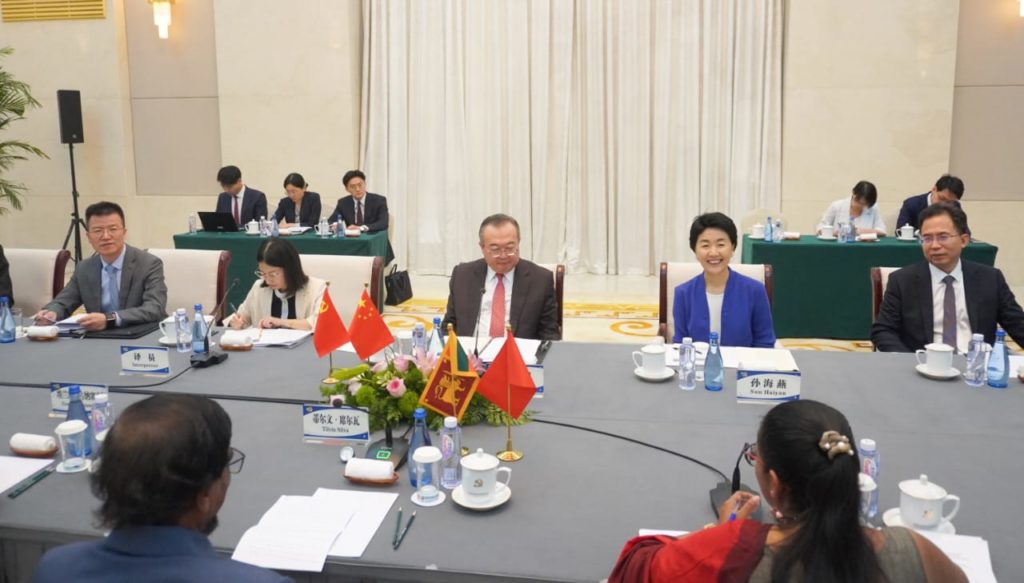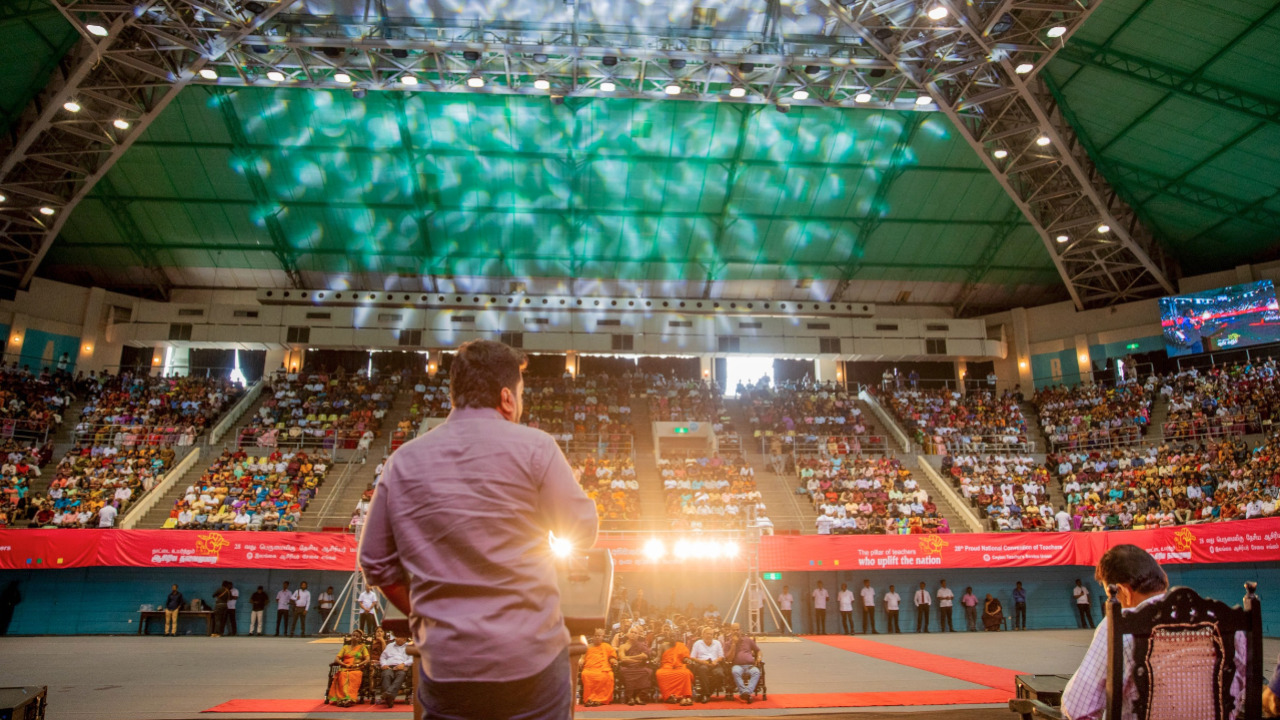
(-2025.10.17 – Colombo-) President Anura Kumara Dissanayake called upon the entire teaching community to work together over the coming years for the new transformation the country needs, in the same vigorous manner they once mobilised as a powerful force to bring the current government to power. The President stated that the government has already taken […]
(-2025.10.17 – Colombo-)
President Anura Kumara Dissanayake called upon the entire teaching community to work together over the coming years for the new transformation the country needs, in the same vigorous manner they once mobilised as a powerful force to bring the current government to power.
The President stated that the government has already taken the necessary steps to bring about progressive and forward-looking change, not only in education but across all sectors of the country. He emphasised that the nation’s teachers bear a significant responsibility to act as strong drivers and protectors in taking these transformative initiatives forward.
President Anura Kumara Dissanayake made these remarks this morning (17) while addressing the prestigious national convention of the Ceylon Teachers Service Union, titled “The Teacher Front that Builds the Nation,” held at the Sugathadasa Indoor Stadium in Colombo.
The convention, which underscored the need for teachers and principals to stand united and unconditionally to realise the dream of a rich education system in a prosperous nation, saw the participation of a large number of teachers and principals from across the island.
The President further stated that no decision taken, law passed, or project implemented by the government is driven by personal gain for himself or any minister and that the sole determining factor is the benefit to the people. Therefore, the President urged teachers to actively support these decisions while raising any doubts or concerns they may have.
The President explained that the government is committed to a new educational transformation designed to build a highly capable human resource base. He added that plans are underway to restructure the school system and establish advanced vocational training centres in every district to strengthen vocational education.
The President highlighted that the ultimate aim of all these efforts is to fulfil the aspirations of parents who dream of creating a better future for their children a future they themselves were deprived of. He further emphasised that under the present government, no law that the people disagree with will be passed in Parliament.
The President stressed that the government is making strenuous efforts to curb the drug menace, which is currently destroying not only the country’s children but also its youth. He made it clear that, no matter how severe the circumstances, the doors that have been opened in this battle will never be closed again. He affirmed that all necessary measures will be taken to eradicate this scourge for the sake of future generations.
President Anura Kumara Dissanayake further stated;
I am pleased to participate in the convention of the Ceylon Teachers Service Union. I had attended several of these conventions in the past and on each occasion, the objective was to understand both the challenges faced by teachers and those faced by the nation, in order to build the necessary force for transformation.
Therefore, in previous conventions, the focus was on how they were mobilising to seize power. That mission was accomplished a year ago, with teachers playing a leading role. It was the teachers of this country who played a major part in awakening a fearful society and delivered the first decisive blow that broke the previous regime.
Today we are holding this convention as a movement that has already gained power. There are significant differences between the challenges and expectations of that time and those of today. When the people of this country gave us the mandate at the last election, they had high hopes, expectations and clear objectives. Now, as the government and as a working collective, our duty is to fulfill the people’s aspirations through the power entrusted to us. We have commenced significant work in this regard and anticipate many remarkable victories eventually.
We all know that as a country and as a people, we have in recent times faced the consequences of the economic policies followed by our nation over a long period, the consequences of the political culture that prevailed for decades and the consequences of the erosion of the rule of law over many years.
Our foremost challenge is to build a strong and stable economic foundation for the country. However, a nation cannot be rebuilt by focusing solely on the economy without ensuring the rule of law and creating a society free of conflicts. Therefore, strengthening the economy and laying the necessary groundwork for it is our primary responsibility.
Many people believed that the law would not reach them because of their wealth, the power they wield, or their privileged family backgrounds. But we have demonstrated to society that there is no one in Sri Lanka who is above the law. Everyone is subject to it. At the same time, a major transformation of the political culture is essential. Alongside this, we must achieve economic stability and growth.
Many are saying today that we must begin debt repayments in 2028, but that by then, the country will be unable to meet its obligations. Therefore, building an economy capable of meeting debt repayments by 2028 has been made a key part of our policy framework. Several important sectors are involved in this effort. This year can be identified as the year in which Sri Lanka earned the highest revenue relative to its national production in history. We are now laying the groundwork to rebuild the country with its own strength, while systematically reducing borrowing.
For this, we need a strong public service. Over the past period, our public service has been significantly politicised. Some state institutions and buildings were established to serve political agendas. To strengthen the public service, it must become an attractive sector. Accordingly, for the first time in many years, we have taken steps to increase the basic salaries of public servants in three stages. For 2025 alone, the government has allocated Rs. 110 billion to pay for the salary increase. Over the three years 2025, 2026 and 2027, the total expenditure will amount to Rs. 330 billion. There are also salary anomalies that cannot be addressed by salary increases alone. We are paying attention to these issues and taking swift measures to minimise such disparities.
I am aware that there is a disparity in the pensions of retired teachers. Those who retired before 2020 receive pensions calculated based on their 2020 salaries, while those retiring from 1 January 2025 onwards will have their pensions calculated on their 2027 salaries. However, there is a special group of teachers who received a unique salary increase in 2022. These disparities will be addressed, though it will take some time. We are gradually putting in place the mechanisms needed to build a strong public service.
We must also build a highly skilled human resource base. To produce citizens with advanced capabilities, we have directed our focus towards education. A major transformation in education is necessary. Special attention has been given to vocational education, with plans to establish 25 strong vocational training centres, one in each district. We are undertaking a significant educational transformation to ensure the continuity of children’s education.
We must also remove the divisions within the school system. Through this year’s Budget, we expect to increase the allowances provided to teachers in rural and isolated schools. A modernisation of the school system is essential. There may be significant resistance to these changes, but we are committed to restructuring the school system and for this, we need your support. Every parent in this country shares a dream: that their children should have a better future than they themselves had. Our aim is to fulfil those parental aspirations. Therefore, I urge you to extend your support to these educational reforms.
There has been some concern regarding a proposed amendment to the law. However, this draft has not been passed by Parliament. Laws are not made for me or for Parliament; they are made for the citizens. I assure you that no law that the people disagree with will ever be passed in Parliament. The era of drafting laws and amending the Constitution to suit the needs of those in power has now come to an end.
Furthermore, drug abuse has become the greatest challenge faced by the children of our country. Even very young children are rapidly being drawn into the trap of drugs. This is a major social catastrophe.
Regardless of ethnicity, religion, or caste, drugs are spreading like a devastating whirlwind, destroying our young generation. This must be stopped without fail.
We have opened the iron door of drugs and crime. When we examine it, a far more terrifying picture emerges than we had imagined. The state, political authority and legal institutions have been left at the mercy of criminals.
We could have closed this door and remained silent, or we could keep it open and carry forward the steps we have initiated. As a government, we have decided not to close this door but to move forward and eliminate this scourge. If we are to create a learned, aware generation that can have faith in the future, this duty must be fulfilled. Therefore, we are taking every possible step to destroy the roots of drug menace.
It is normal for society to view new changes with suspicion. Ordinary people are accustomed to habit and fear change. However, these changes must be carried forward. In every sector, we have laid down the steps required for progressive, forward-looking transformations. As these steps are advanced, you must become the drivers and protectors of these progressive measures, just as you were a powerful force when authority was established in the past.
No decision taken by our government, no law we enact and no project we implement operates to satisfy the personal needs of myself, our cabinet, or our ministers. All these changes are for the benefit of the public. Our criterion is the benefit received by the people.
For the first time in Sri Lanka, a government that previously served private interests has been transformed into a government that serves the interests of the public. Every decision, every policy is made for the people. Therefore, I invite you to question if you have doubts, to ask if there is any disbelief. But stand up for these decisions. Your support, as a powerful and influential generation of thought leaders in our country, is especially vital to bring about this transformation.
Your contribution is crucial not only for educational reform but also for the complete transformation that this country requires. Let us unite under a single purpose and work together for several years. Surely, we can achieve the results we expect. For this reason, I invite all of us to come together.”
The meeting was attended by Minister of Agriculture, Livestock, Land and Irrigation, K.D. Lal Kantha; Deputy Minister of Labour and General Secretary of Ceylon Teachers Service Union; Mahinda Jayasinghe,; Dammika Alahapperuma, President of Ceylon Teachers Service Union; Deputy Secretary Prakash Koralasingham; and Chithrani Manchanayake, Secretary of the Negombo Division of Ceylon Teachers Service Union.
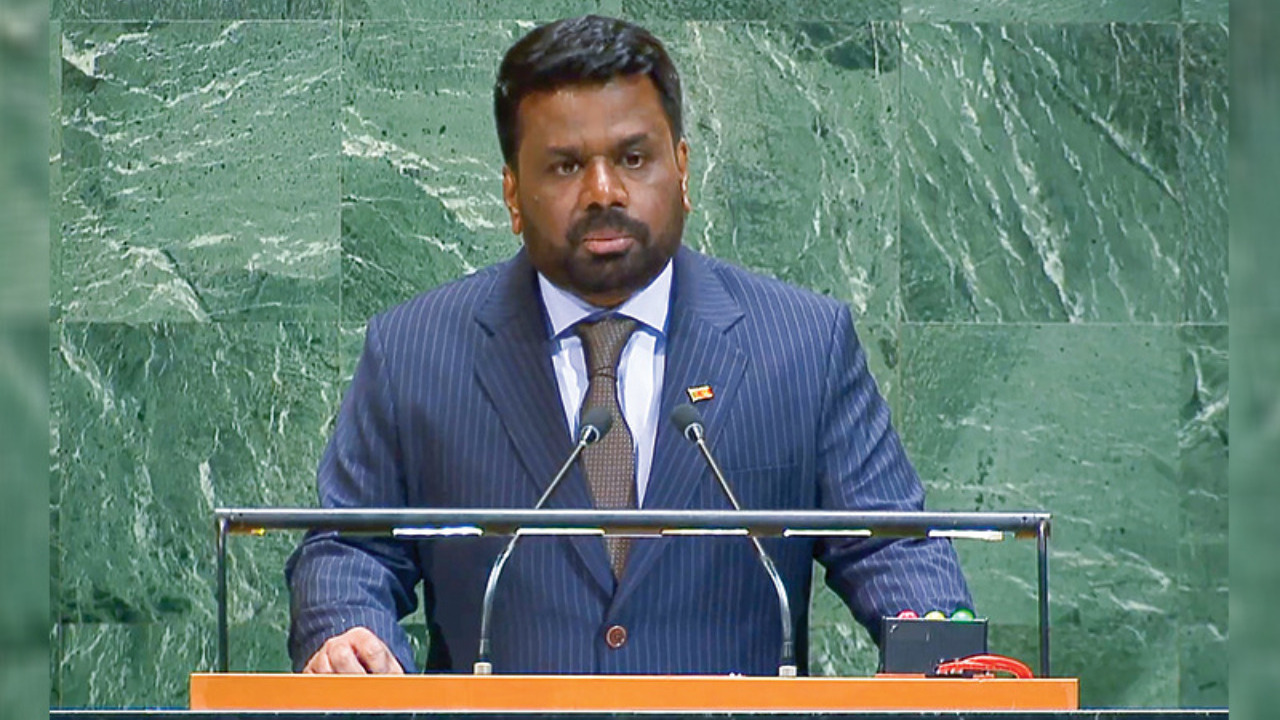
(-2025.09.25 – USA -) • Let us commit ourselves to creating a safe world for future generations – President urged world leaders President Anura Kumara Dissanayake, addressing the 80th session of the United Nations General Assembly, urged world leaders to commit themselves wholeheartedly to building a safe world for future generations. The President stressed that […]
(-2025.09.25 – USA -)
• Let us commit ourselves to creating a safe world for future generations
– President urged world leaders
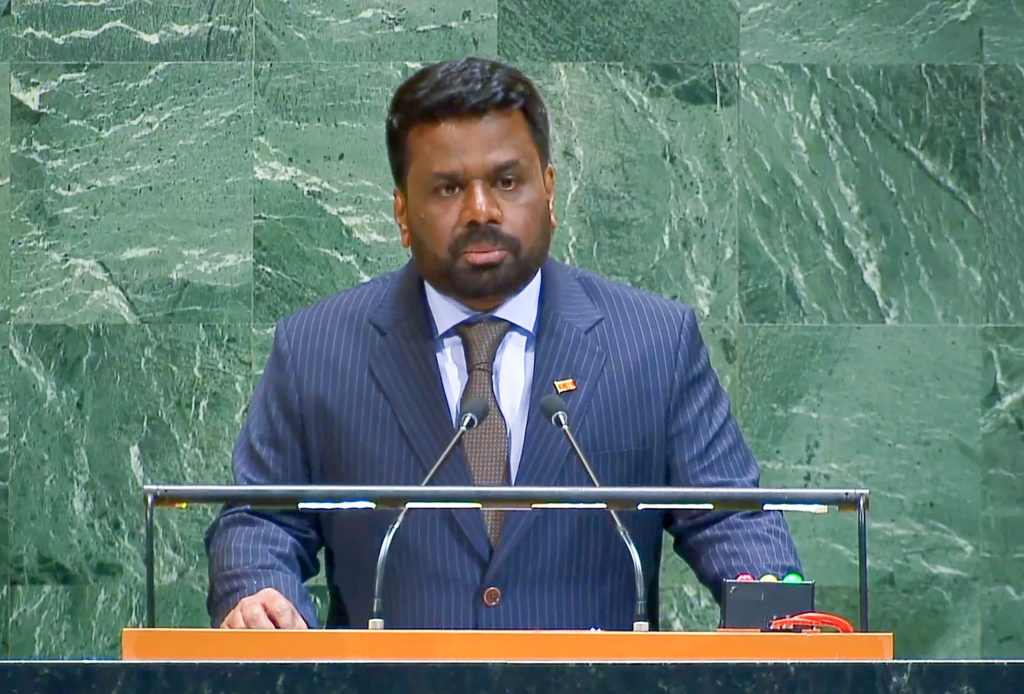
President Anura Kumara Dissanayake, addressing the 80th session of the United Nations General Assembly, urged world leaders to commit themselves wholeheartedly to building a safe world for future generations. The President stressed that nations must walk hand in hand, not apart.
Speaking at the UN Headquarters in New York on the 25th morning Sri Lanka time, the President expressed deep concern over the ongoing humanitarian catastrophe in the Gaza Strip. He called for an immediate ceasefire, the unhindered delivery of humanitarian aid and the release of hostages by all parties, in line with agreements reached by the United Nations and other stakeholders. He further emphasized that strong international pressure must be applied to halt the continuing violence and killings.
Furthermore, President Dissanayake emphasized in his address the issue of poverty, which has led to numerous global challenges. He asserted that both inequality and poverty ought to be regarded as a worldwide catastrophe that requires urgent attention.
The President emphasized the constructive measures implemented by Sri Lanka to address the global drug issue, a multifaceted challenge impacting millions worldwide. He urged world leaders to collaborate in advancing the global initiative aimed at eradicating the drug menace, which endangers global health, democracy, politics and the overall well-being of society. He proposed stricter enforcement of laws against traffickers, limiting their ability to migrate across borders and establishing more rehabilitation centers for drug addicts.
Turning to corruption, President Dissanayake described it as a destructive force that undermines development, democracy and social well-being while perpetuating poverty. He noted that Sri Lanka has already embarked on this difficult but essential fight for the sake of future generations and urged all countries to embed the culture of anti-corruption within their governance.
Concluding, the President said that the Sri Lankan people, who have chosen the path of light over darkness, are united around the vision of “A Thriving Nation – A Beautiful Life.” He explained that this historic goal is being advanced step by step through corruption-free and ethical governance, poverty eradication, digitalization and environmental sustainability, with equal emphasis on strengthening education and healthcare.
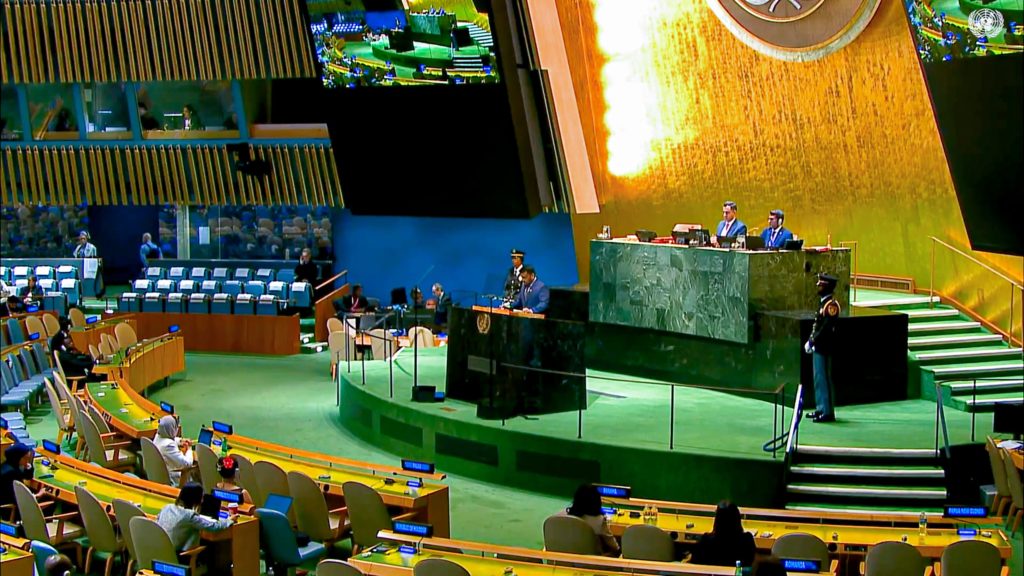
The full speech delivered by President Anura Kumara Dissanayake at the 80th Session of the United Nations General Assembly is as follows:
Madam President, Mr. General Secretary, honoured invitees and distinguished delegates,
Allow me, Madame Annalena Baerbock, representing the beautiful country of Germany, to begin my speech by offering my warmest congratulations to you on being elected the President of the 80th session of this organisation, formed with the noble aim of bringing about a just and lasting peace among the nations of the world.
I would also like to use this opportunity to express my country’s appreciation to His Excellency Philemon Young for the exceptional leadership he provided during the 79th session. We are gathered here today to plan the future path of this organisation, which has worked tirelessly for eight decades to bring about a world of peace.
It is my honour to address this August Assembly for the first time as the President of Sri Lanka.
As representatives of nations, we all bear the responsibility to work towards fulfilling the aspirations of our people. The decisions we make now will impact people across the world and play a decisive role in the future of this planet, our common home.
Distinguished delegates,
Our decisions will have a very important impact on our future. Poverty, a tragedy as old as human civilisation, has accompanied humankind on its journey through time. For centuries, countries across the world have faced this painful and relentless struggle. Poverty and problems stemming from it are also casting an oppressive shadow on our future. This assembly must pay special attention to eradicate extreme poverty. I believe our conscience dictates us to do so.
Distinguished delegates,
For centuries, many countries in the world are struggling against poverty. Poverty is a terrible enemy with many faces. Even as we gather here in the countries we represent, including in my own, children are suffering from hunger. A child’s right to education is an internationally accepted fundamental right.
This right is enshrined in the constitutions of most of our nations. Yet, across the world, poverty has denied this right to hundreds of thousands of children. In a world which boasts of its technological advances, how can there be children without access to education? Education is the foundation of every great nation.
It is the most vital factor deciding one’s future. We firmly believe that investment in education is an investment in global progress. Many developing countries are constrained in their struggle against poverty by indebtedness.
Low-income countries allocate twice as much on debt servicing than on education or healthcare.
Our people and our countries are caught in debt traps. The 2030 Agenda for Sustainable Development pledges to leave no one behind and to reach the last first. The Agenda acknowledges the most critical challenge before the world is the challenge to end poverty.
I would also like to recall the decisions taken at the Global Summit for Social Development in Copenhagen in 1995.
However, wars and political upheavals and the COVID pandemic have obstructed the fulfilment of these hopeful agendas. I propose to you that the time has come to accept that inequality and poverty are a global catastrophe and we should act accordingly.
Madam President, esteemed guests,
Drugs and organised crimes linked to drugs have become a serious concern to this world. This has been acknowledged in the World Drug Report 2025 published by the United Nations Office on Drugs and Crime.
The drug problem is a complex issue affecting millions of people globally. The market for drugs and the related criminal organisations are creating issues globally. Drug cartels are turning entire states into their hunting grounds. They pose a major threat to global health and politics and eventually global well-being as well.
While Sri Lanka is taking effective steps to address this challenge, I respectfully request all of you to join in the effort to implement the global agenda on drugs and crime.
I bring to your notice the need to implement the law strictly against these drug traffickers and prevent drug traffickers from taking refuge in our countries and also to set up rehabilitation centres for rehabilitation purposes.
Madam President, honoured guests,
We regard corruption as an epidemic causing widespread harm to broad swathes of society. We believe corruption to be an obstruction for development, a decisive threat to democracy and global well-being and also a cause for poverty. Let me remind you that fighting corruption is dangerous, but not fighting corruption is even more dangerous.
The Universal Declaration of Human Rights of 1948 was a remarkable victory for the people of the world. Civilisational achievements were never accomplished overnight. They were all results of unwavering efforts and sacrifices. And the struggle against corruption is also a difficult one. We must take the necessary steps here. The first step may be difficult, but if the courageous first step we take is correct, a thousand steps will follow. That is what I believe.
Madam President, delegates, be brave. All the rest will follow.
Sri Javaharlal Nehru has once stated so. I represent a small island of nearly 22 million people. Sri Lanka’s population is about 0.30 of the global population. It is true that we are small in size and in numbers, yet we have begun the struggle against corruption for the future generations of our country and the world. I propose that an integral part of the culture of all UN member countries should be to fight against corruption.
Madam President,
I feel confident that all of you will join me in condemning war. There is no nation in the world that desires a war. The result of a war is a tragedy wherever it happens. We all know that. Even now, many countries of the world are experiencing the pain of that tragedy. As a country that lived through a three-decade war, we know well the futility of war. No one who sees the pain and the suffering of parents, spouses and children of the victims of war would never dream of another war.
We have witnessed these painful sights with our own eyes. Even as suffering caused by conflict has reached unprecedented levels, the international community has become reduced to bystanders.
Opportunistic power politics has turned the lives of children and innocent civilians into a game. No one has the right to inflict pain and suffering on another to enhance one’s own power. The duty of a ruler is not to destroy lives but to protect them.
We are deeply distressed by the ongoing catastrophe in the Gaza Strip. Gaza has been turned into an open prison full of pain and suffering, echoing with the cries of children and the innocent civilians. The United Nations Organisation and all related parties must work towards an immediate ceasefire, enable adequate humanitarian aid to these areas and to ensure the release of hostages of all parties. We recognise the Palestinian people’s inalienable right to their own state.
We also believe that legal, security and humanitarian concerns of Israel and Palestinian people need to be acknowledged.
Sri Lanka reiterates the importance of early implementation of the UN General Assembly resolutions regarding a two-state solution on the basis of the 1967 borders. The time has come for the international community to stop being a mere spectator and to move decisively to end the suffering of millions.
Religious extremism and racism have been major causes of wars and conflicts, bringing suffering to millions of people. Although a century has passed since the abolition of slavery, the poison of racism still lingers in many places. Extremist and racist ideas are as deadly as epidemics. We must ask ourselves how these extremist and racist ideas survive like sparks under the ashes in a world that has witnessed so many advances on so many fronts.
I believe that we must awaken our conscience to oppose racism and religious extremism in protection of human rights and freedoms. We must be brave enough to speak up for peace. We must not be afraid to speak up against war. We must be afraid to speak up for war. In a world where millions of children die of hunger, we spend millions on weapons. When tens of millions die of inadequate health facilities, hundreds of millions are spent on futile wars. When hundreds of thousands of children are denied the right to an education, millions are spent on invading another’s land.
If every inch of this world can be turned into peaceful communities, what a wonderful world would it be. As a country that suffered the horrors of war for decades, where families still weep in remembrance of their loved ones, we have a duty to make that heartfelt proposal.
I would like to remind you that at the last election, the people of Sri Lanka decided in favour of a centuries-old dream. A legislature has been established according to that decision, reflecting the ethnic and religious diversity of the country.
A parliament has been established with women and other marginalised communities in representation. We believe that the duty of legislatures is to develop the country and the people, not to develop themselves. And we have established that idea.
Madam President, distinguished guests,
Our people have chosen light over darkness. They have given their approval to realise the vision of a thriving nation, a beautiful life. To fulfil this historic mandate, we have focused on establishing non-corrupt administration, poverty eradication, and digitalisation. And we have also placed great emphasis on education health as well. We are moving towards these goals step by step. Digital democracy is one of our aims.
Ensuring that every person and every country can enjoy the opportunities of the digital age is a global challenge. If we succeed in our task, we will be able to open doors to technology, accelerate development, and to strengthen governance. If we fail, technology will turn into one more force, worsening inequality, insecurity, and injustice.
The digital gap between states that can and cannot establish access to digital tools is clear. An even greater gap is being created in relation to artificial intelligence. Sri Lanka and many other developing nations in Asia and also many other nations are facing challenges in using AI as a development tool due to the inadequate infrastructure facilities.
Madam President, distinguished delegates,
I ask the international community to work together and we have to develop a dignified society, a dignified world. I present this August assembly a proposal to set up a neutral sovereign Artificial Intelligence zone. We must build a new and better world, a world which represents the dignity of humankind. You as members of this assembly must be the architects of that better world.
As President Harry Truman stated on the occasion of founding the United Nations, in your hands rests our future. We must not act in fear or under compulsion, but with hope for a better and more secure world.
Today we must commit ourselves not to lead the world to another disaster, but to make it a better place for the next generation.
I have dreams and expectations for my country. Similarly, you have dreams and expectations for your countries. My dream is to ensure that my people are rich and they have happiness. I believe that you too have such dreams. We must try to achieve these dreams not in competition with each other, but by working arm in arm, peace, dignity, and equality on a healthy planet. That is the motto of the United Nations organisation. Therefore, let us become the true healers of the world.
Thank you very much.
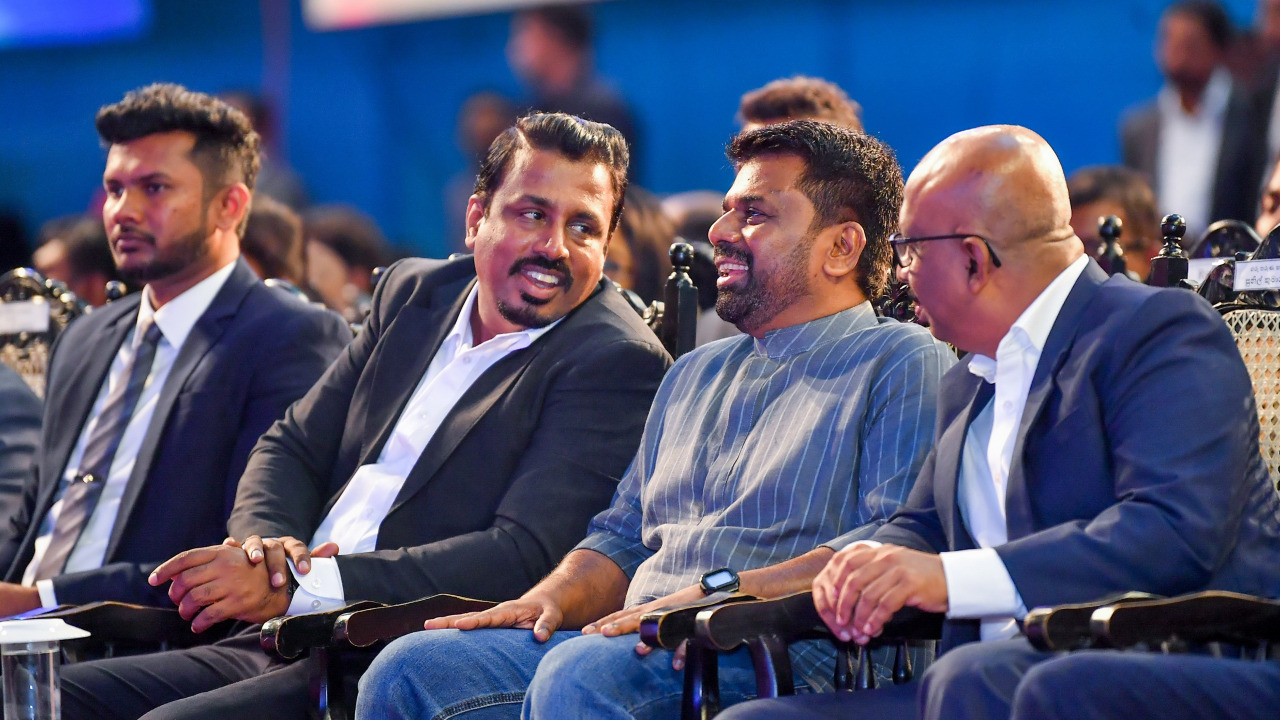
(-2025.08.12 – Colombo-) • The youth movement has evolved into a force that cultivates leaders poised to steer the nation’s future – President President Anura Kumara Dissanayake stated that, with the beginning of the new political transformation, the youth movement in the country has transitioned from being a political pawn to a platform that cultivates […]
(-2025.08.12 – Colombo-)
• The youth movement has evolved into a force that cultivates leaders poised to steer the nation’s future
– President
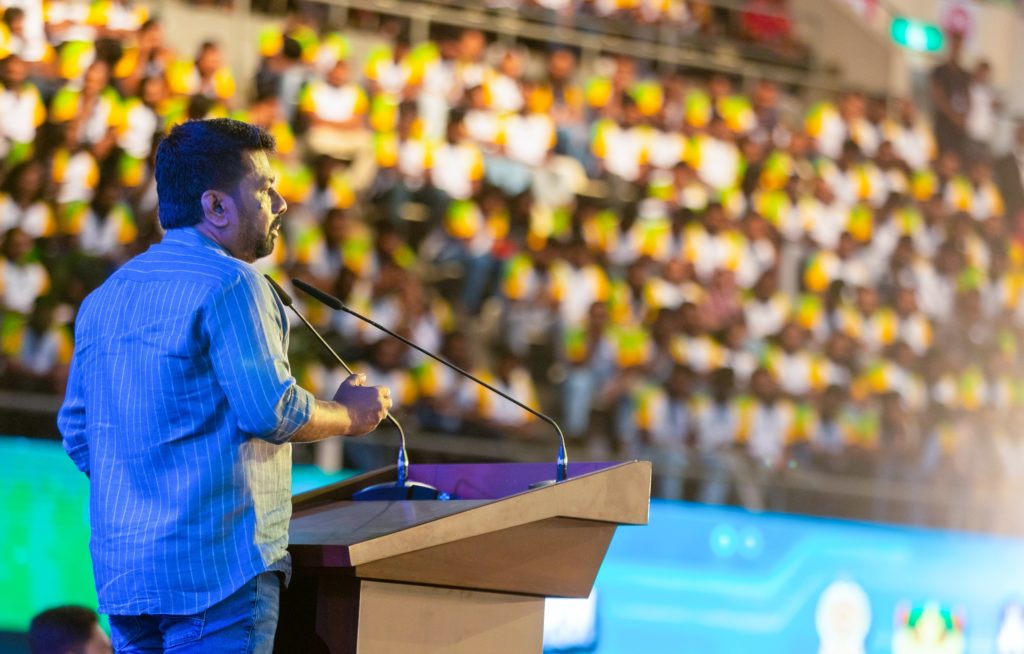
President Anura Kumara Dissanayake stated that, with the beginning of the new political transformation, the youth movement in the country has transitioned from being a political pawn to a platform that cultivates competent leaders prepared to lead the nation’s future.
The President stressed that the government’s goal is to establish a youth community empowered to shape its own future, ensuring that young people are given their rightful role, rather than merely serving as contributors to the maintenance of political power. He further stated that a programme will be launched through the youth movement to transform young men and women into leaders and stakeholders in the country’s development path.
President Dissanayake made these remarks this morning (12) addressing the “Youth Club” National Youth Conference held at the Sugathadasa Indoor Stadium in Colombo.
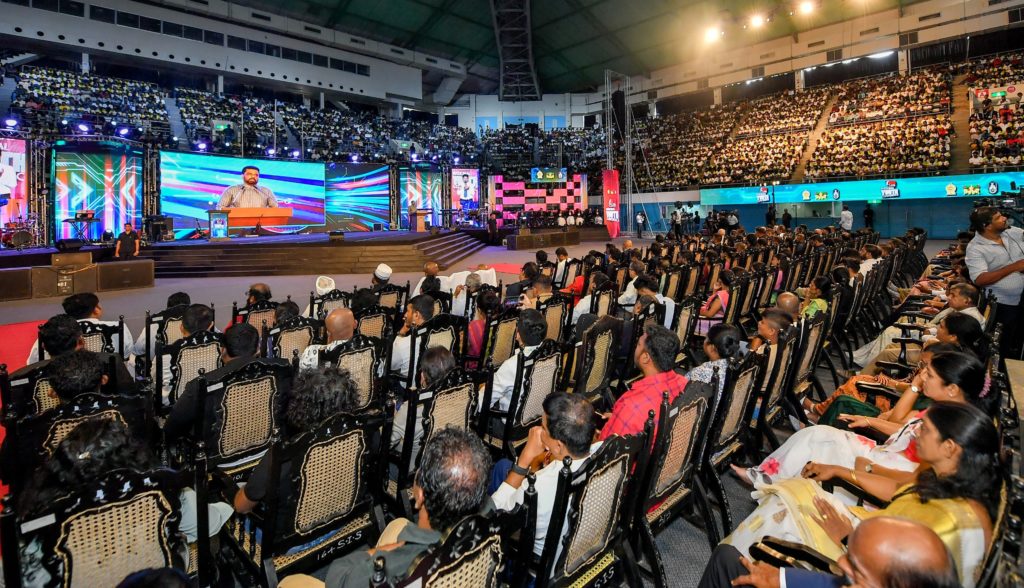
The President highlighted that the future generation should be one that represents Sri Lanka proudly on the global stage and is guided by empathy towards others. He stressed that the government is committed to creating such a qualified generation to take over the country’s future, while calling upon all youth across the nation to strive to become those capable leaders.
This year’s National Youth Conference was notable for being held after a lapse of 32 years, with the participation of over 6,000 young men and women from across the island. In the lead-up to the conference, “Youth Clubs” were established at the regional level throughout the country and during today’s national gathering, the newly appointed officers were officially introduced.
In conjunction with his participation in the National Youth Conference, President Anura Kumara Dissanayake was also presented with a commemorative gift.
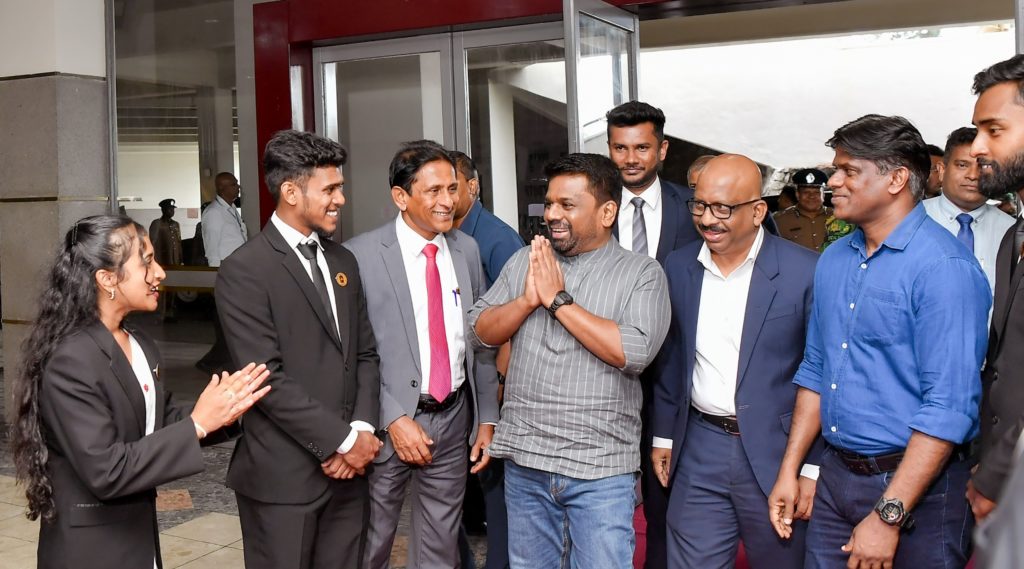
Addressing the Conference, President Dissanayake further stated:
“I believe this is the most-discussed and most-anticipated youth conference in recent times. Generally, in our country, many sectors have been driven by the desire for political power. Within the youth movement, there has never truly been an opportunity for individuals to progress based on their own talents and aspirations.
When you visited the districts, who were given precedence in taking on political leadership or leading other institutions in your district? Priority was given to the daughters, sons or relatives of the old political leadership. As a result, the youth movement was largely aligned with the political ambitions of those in power. For a long time, this youth movement was developed as a tool to protect their own political influence, maintain family power and keep leadership within their kinship networks.
However, with the new political transformation in the country, this youth movement has evolved beyond being merely a pawn of political ambitions. It has transformed into a movement that nurtures leaders who will take responsibility for the country’s future. This transformation has been clearly reflected throughout our journey up to this National Youth Conference.
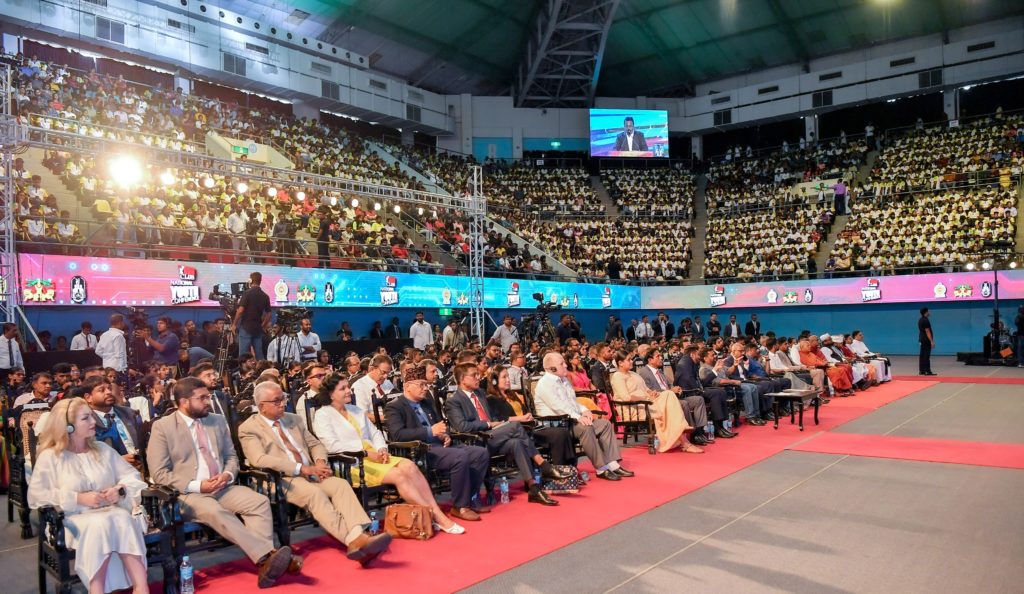
It’s no surprise that some feel uneasy. Today, what we are truly doing is empowering our youth by giving them their rightful place and helping build a responsible young leadership that understands how their future should be shaped and what duties they must bear. This is not about creating mere tools to maintain family dynasties or political power for extended periods. There’s talk that the future of the country lies in the hands of its youth. But our true ambition is to make you the real custodians of that future, those who genuinely hold the responsibility for our nation’s path forward.
Specifically, there is one point we want to make clear to you here. Today, we hold positions such as the Presidency, Ministerial offices and Parliamentary seats. However, even as we occupy these roles, we do so with the firm understanding that there will come a day when we will step aside. We have no intention of clinging to these positions indefinitely. We have a very clear and sincere intention. This country was once under the control of a highly destructive group. We have taken over political power from that group. The power we now hold, we do so with the expectation that, in due course, we will pass the baton to you, the next generation. We do not wish to stay in these roles for an extended duration.
Therefore, we must nurture a new generation of young leaders who possess the ability, competence, integrity and conscience to take responsibility for the country. We need to prepare a generation ready to inherit this nation after us. What kind of generation do we need? In today’s fast-paced world, knowledge is rapidly produced, developed and disseminated. Looking back at history, great leaps in knowledge were achieved over long periods of time. However, today, the knowledge we already possess is rapidly generating new knowledge at an unprecedented pace. Moreover, this new knowledge is growing and spreading quickly. The future of the country must not be entrusted to a generation of youth who are unprepared to grasp and harness these vast and rapidly expanding realms of knowledge.
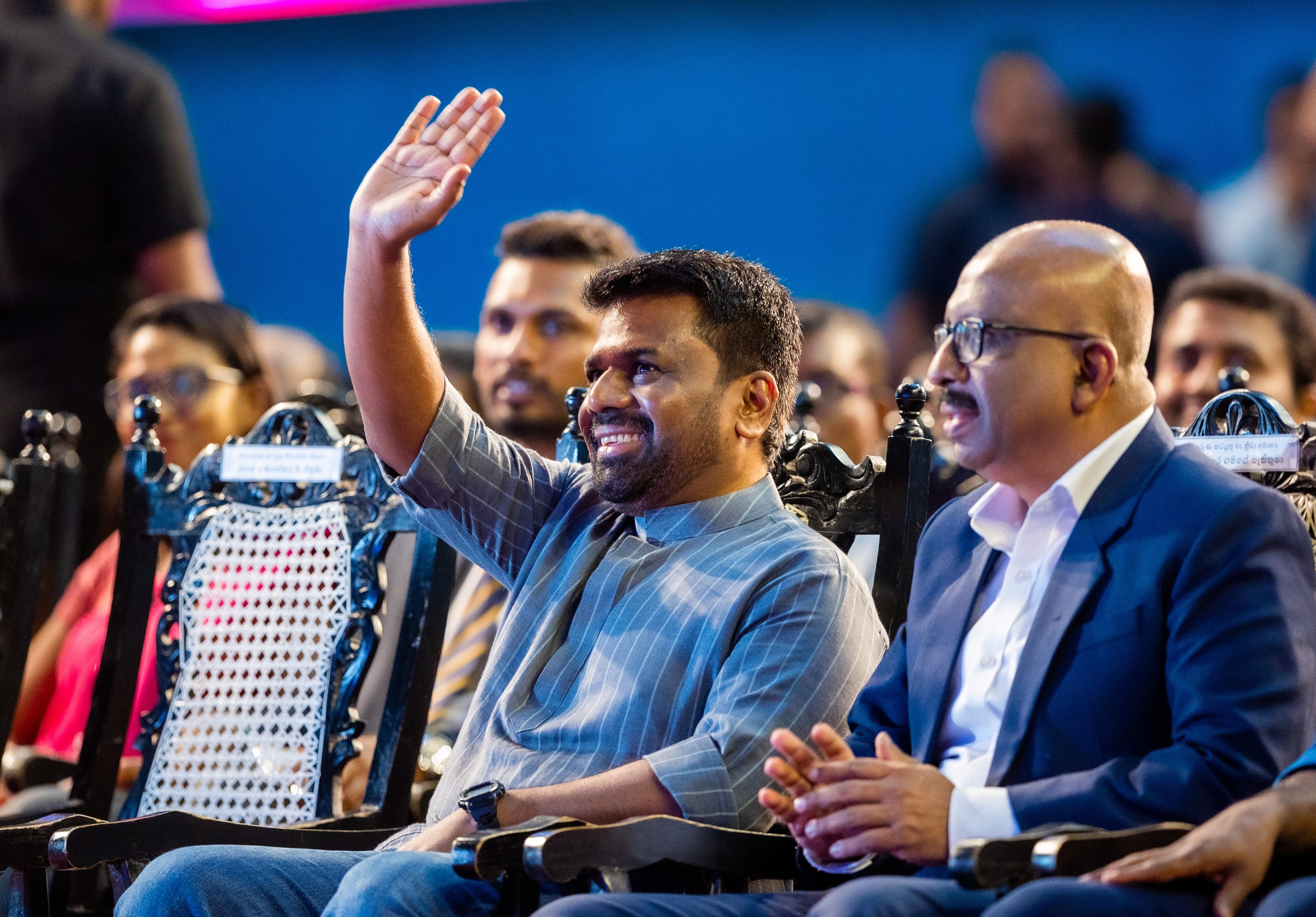
Therefore, our aspiration is to create a new generation for the youth movement, one that rapidly adjusts the fast-growing knowledge of the modern world and quickly adapts to it. We stand firm in the belief that the future of our country must be entrusted to this new generation. Furthermore, compassion and empathy must be inherent within us.
Currently, our education system and way of life have confined our youth within a self-centred shell. Within such a group, genuine empathy towards society is lacking. This is why we need a young generation that truly cares for the broader community. Self-centeredness has frozen and destroyed many valuable qualities in our society, extinguishing much of what is good.
To lead our country forward and achieve meaningful social development, it is essential to build a society rooted in genuine empathy. In this endeavour, the youth movement has been entrusted with a significant role. I firmly believe that you must become citizens who embody empathy and compassion.
Similarly, the innate desire for justice and fairness among the youth must be rejuvenated. Wherever injustice exists, there should be a courageous voice to speak up for justice. For such a voice to be genuine and not merely superficial, one must first become a person who truly values justice and acts with fairness. Unfortunately, a significant portion of our society today is driven by deception, many speak about justice and strive to appear as champions of fairness, but we must honestly reflect on how deeply justice and fairness are actually embraced in their actions.
Raising a voice for justice alone does not transform someone into a just and principled individual. The primary measure of becoming a just citizen lies in how sincerely one upholds justice and acts fairly. Therefore, before you raise your voice for justice and stand for fairness, become a young person with a genuine conscience who truly embodies justice and fairness. We are not entrusting this country to a mere crowd, rather, we are handing over the future of the nation to a new generation that is closely connected to the world and possesses empathy for society. Hence, our mission is to build a youth movement qualified to take responsibility for this country’s future. I urge you to become that qualified young generation.
Today, an issue regarding employment has arisen. Recently, I visited the Maldives, where nearly 30,000 of our young men and women are engaged in jobs. However, these are not government positions. The government there has developed a distinct economy externally. Yet, we have long failed to build an economy that generates employment for skilled and capable people in the informal sector. As a result of this failure, the state itself has become an institution that merely provides jobs. It must not be forgotten that a government should be an institution that creates employment, not just one that supplies jobs.
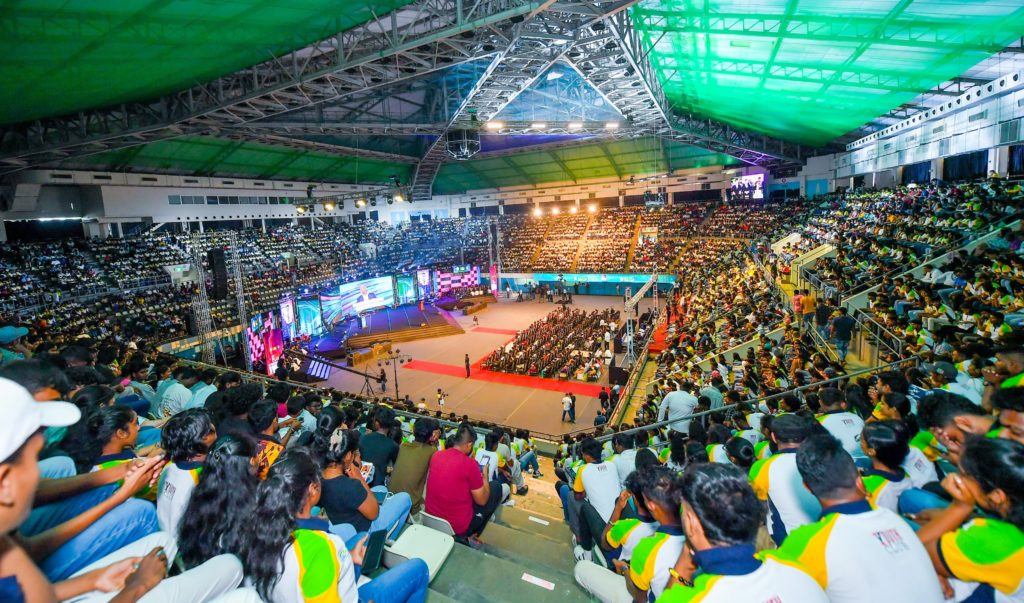
We all know that the 20th century witnessed major transformations worldwide. Before that century, scientists predicted that states equipped with advanced technology would emerge. Politicians and scholars envisioned the creation of a political world quite different from before, one governed not by monarchies or ruling elites but by governments elected by the people. Similarly, economic experts foresaw the development of new global economic conditions. In this way, what we mostly encountered during the 17th and 18th centuries were only speculative ideas about the future world. These speculations became a reality only in the 20th century.
Due to transformations in technology, science, the marketplace and people’s lifestyles, a vast global market has emerged. However, we have become a nation that has failed to fully grasp and benefit from this market. As a result, an informal economy has not been developed and the government has become the sole institution providing employment.
We need to modernize a government that has become largely stagnant. To this end, Cabinet approval has been granted to recruit nearly 62,000 people into the public service. However, the employment issue cannot be solved merely by this. We must create an open economy through government processes that generates employment opportunities. Plans have already been prepared toward this goal.
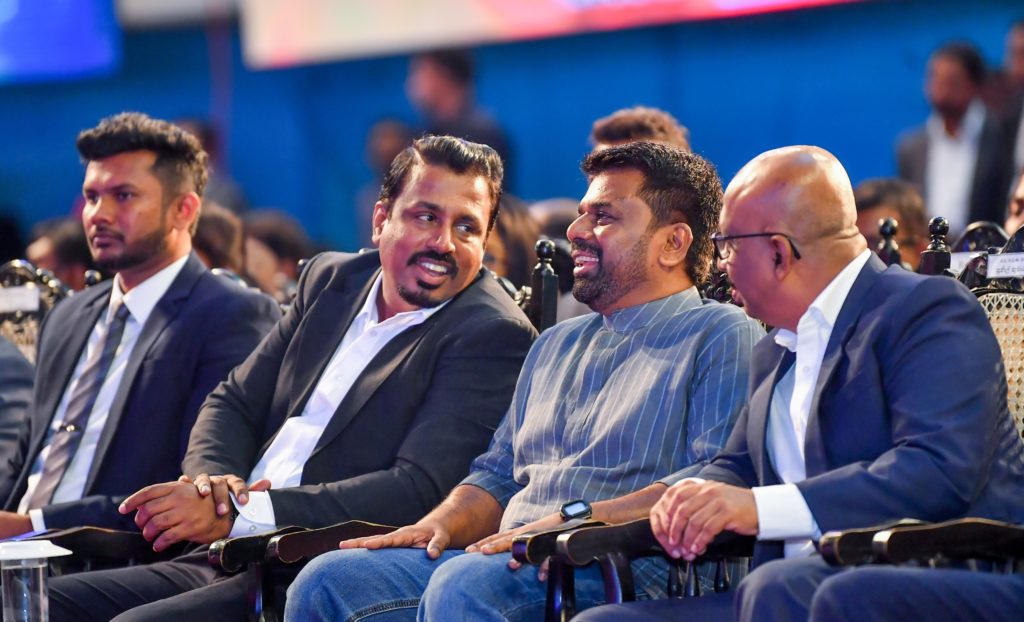
We expect that 2.5 million tourists will visit our country this year, and by 2030, this number is anticipated to grow to 4 million. Along with this growth, an economy based on the tourism industry will be established in the open market, and this economy will generate employment opportunities.
We also anticipate that by 2030, the digital economy will grow to reach US $ 15 billion. Our goal is for the digital economy to contribute 12% of the country’s national output. Additionally, we expect a significant transformation through the digitization of agriculture, fisheries and small and medium-scale industries. To achieve this, we need a young generation equipped with knowledge and skills in information technology. This will also create new employment opportunities. Furthermore, we have planned a large-scale economy based on various sectors, including a port-centric economy.
Accordingly, our strategy involves government intervention to build a nation that generates employment.
We aim to create within the country job opportunities that allow our youth to engage in professions they desire, based on their abilities and lifestyles. Moreover, we have successfully established a trusted and stable economy today. Building on this stability, we are ready to embark on the journey of transforming the country into a prosperous state. In this process, the youth bear a great responsibility.
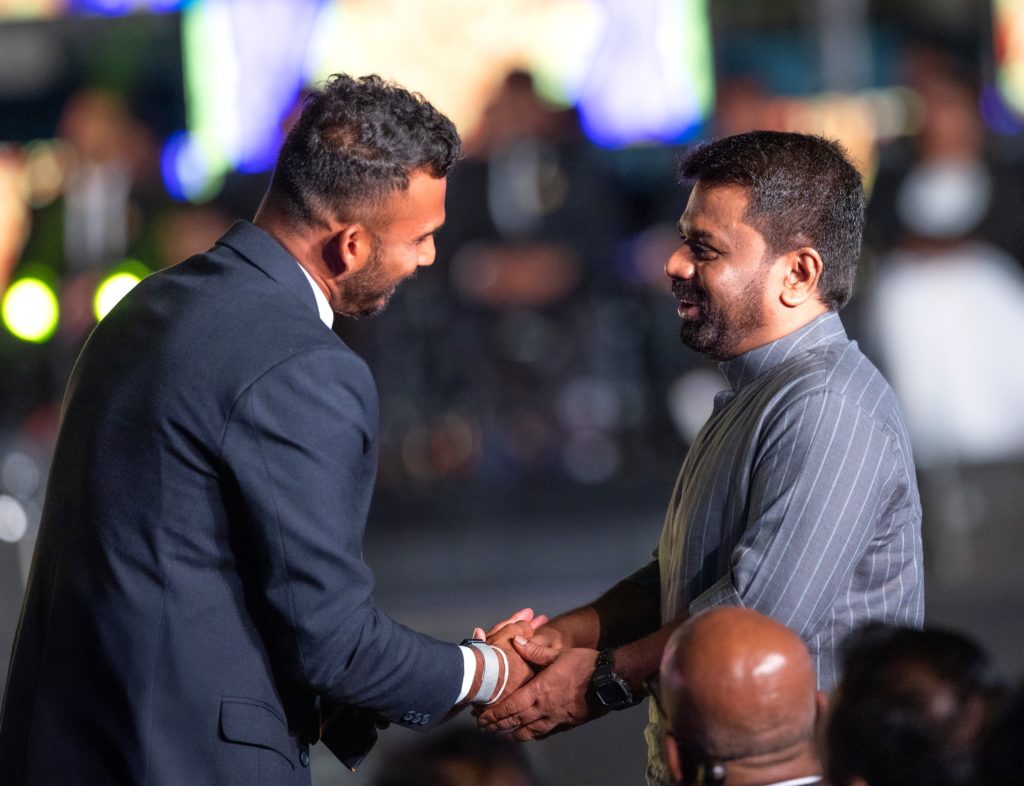
You possess knowledge and enthusiasm. Through this youth movement, we are prepared to launch a programme aimed at empowering you to become the leaders and pillars of this development. You are not excluded from progress, nor are you obstacles to it. Our goal is to establish you as key stakeholders in the development pathway we have designed.
After overcoming a significant and challenging background, you have formed a leadership team. I believe this will enable these young men and women to provide excellent leadership to the country’s youth movement. I wish you success in overcoming the challenges ahead.
This occasion was also graced by the presence of Minister of Youth Affairs and Sports, Sunil Kumara Gamage, Deputy Minister of Youth Affairs, Eranga Gunasekara, Deputy Minister of Sports, Sugath Thilakaratne, Members of Parliament, foreign Ambassadors, government officials and invited guests, including Chairman/Director General of the National Youth Services Council Attorney-at-Law Supun Wijerathna.
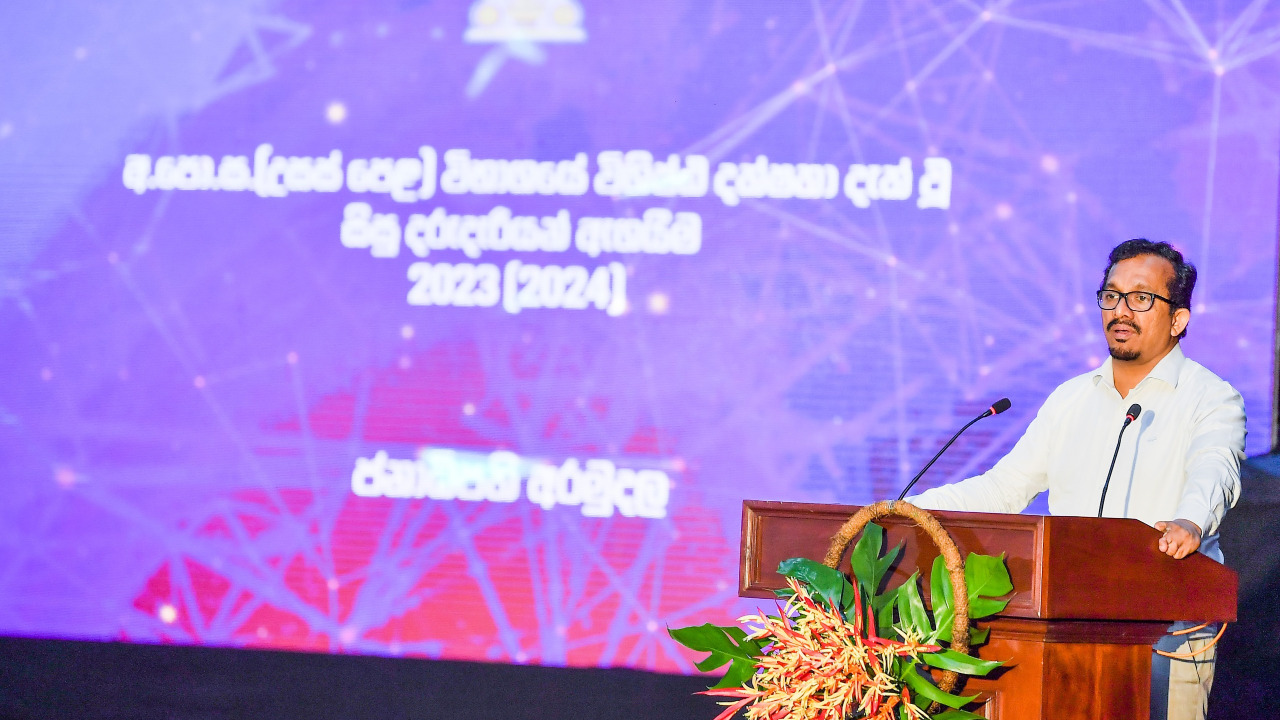
(-2025.07.06 – Colombo-) • Awards of Rs. 100,000 each presented to 361 G.C.E. Advanced Level high achievers from the Southern Province • President’s Fund Transformed into a People-Centric Initiative Under the current Government – Min. Sunil Handunnetti The Presidential Fund has initiated a programme to recognise outstanding district-level performers in the G.C.E. Advanced Level (A/L) […]
(-2025.07.06 – Colombo-)
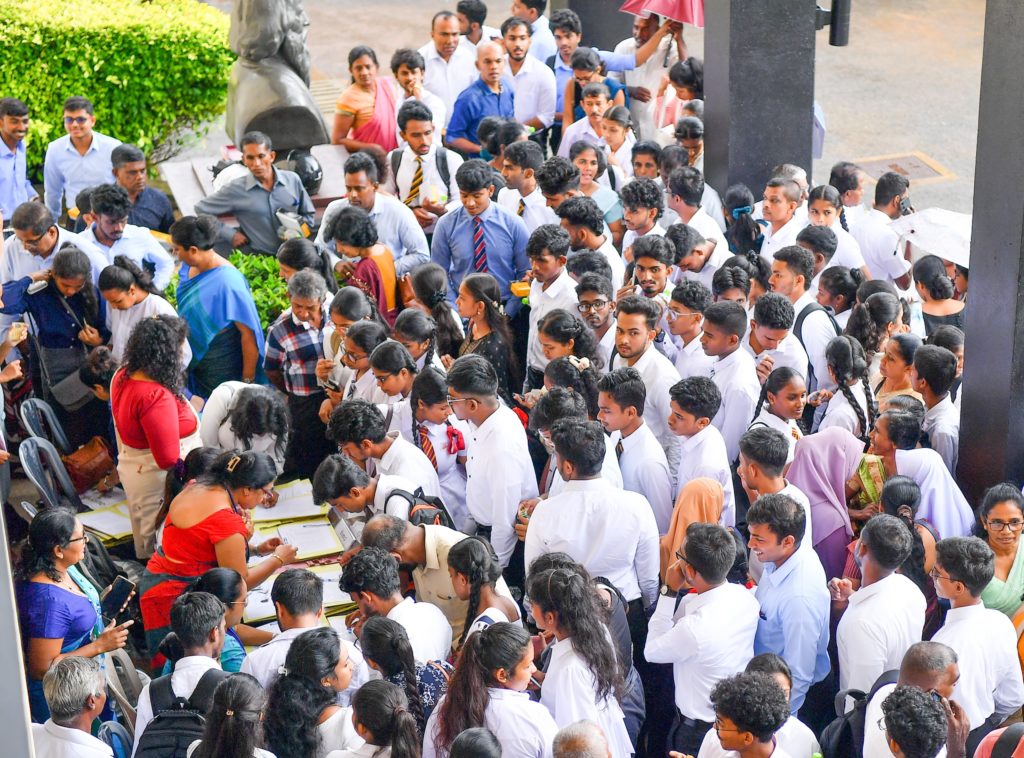
• Awards of Rs. 100,000 each presented to 361 G.C.E. Advanced Level high achievers from the Southern Province
• President’s Fund Transformed into a People-Centric Initiative Under the current Government
– Min. Sunil Handunnetti
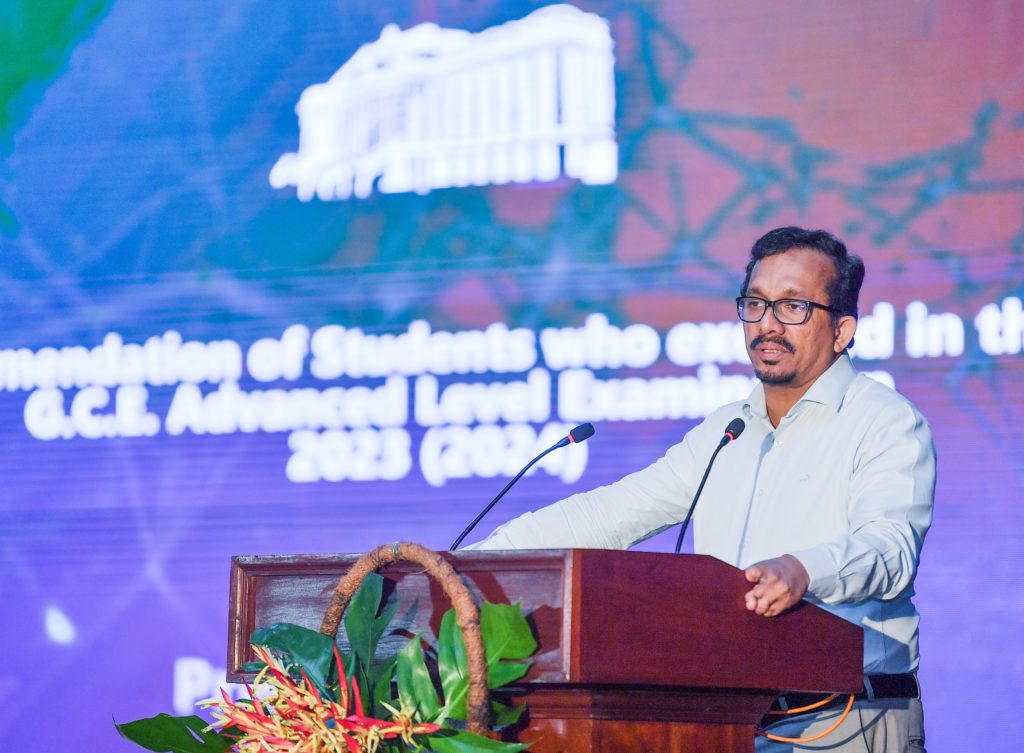
The Presidential Fund has initiated a programme to recognise outstanding district-level performers in the G.C.E. Advanced Level (A/L) examinations over the past two years (2023 and 2024). This morning (6), a ceremony was held at the Rabindranath Tagore Auditorium of the University of Ruhuna to acknowledge students from the Southern Province who demonstrated excellence in the G.C.E. A/L examination.
During the event, a total of 361 students, 10 from each of the six subject streams across Galle, Matara and Hambantota districts for both the 2023 and 2024 A/L examinations, received an incentive of one hundred thousand rupees (Rs. 100,000) each. The President’s Fund allocated 36.1 million rupees for this purpose. This initiative is set to be rolled out across all districts in due course.
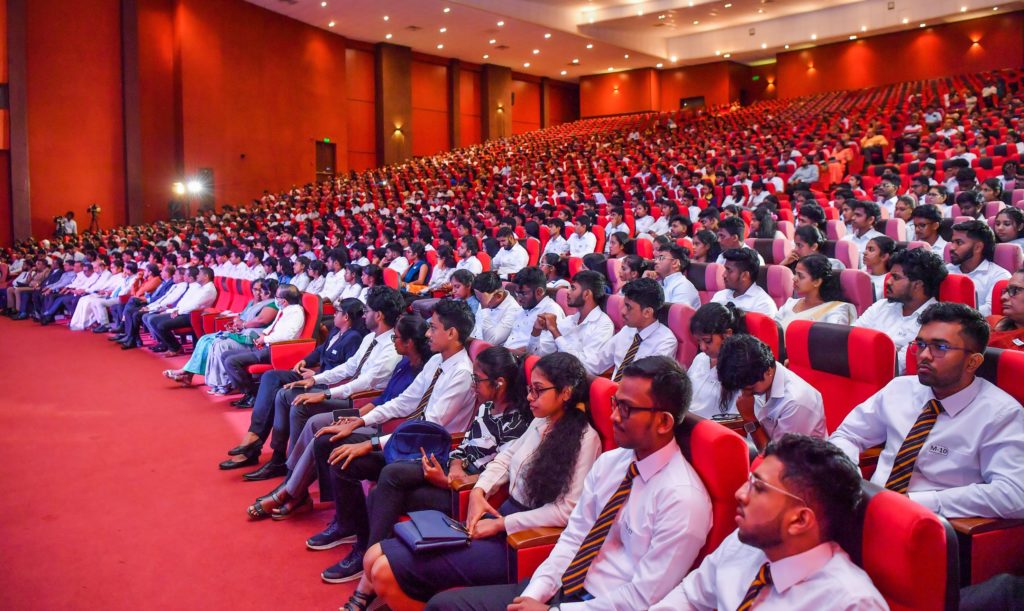
Addressing the gathering, Dr. Nandika Sanath Kumanayake, Secretary to the President, stated that following the new government’s ascension to power and under the directives of President Anura Kumara Disanayake, the President’s Fund has been streamlined to expand its services and enhance transparency. He highlighted that past discrepancies have been rectified, ensuring that benefits now reach those who genuinely deserve them. The Secretary to the President also mentioned ongoing efforts to digitalise the fund and decentralise its services regionally to improve efficiency.
Dr. Kumanayake further emphasised that education is the primary tool for children to succeed in life. He urged the students to make the most of these benefits, excel in their education, and become good citizens, thereby contributing to the nation’s triumph.
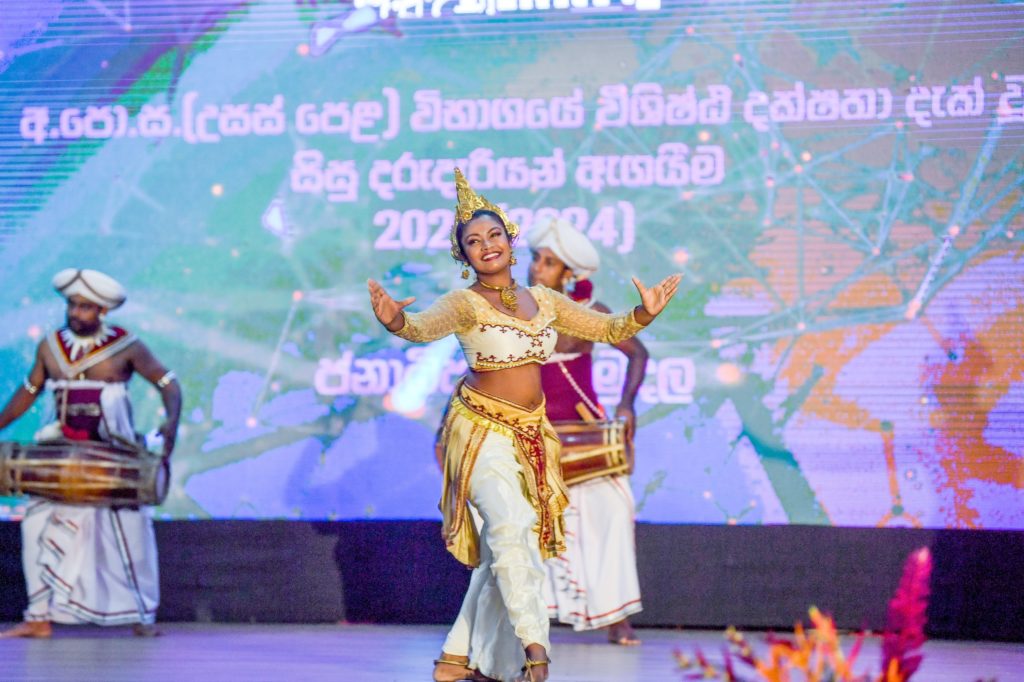
Mr. Sunil Handunnetti, Minister of Industry and Entrepreneurship Development, stated that the current government has successfully transformed what was once “the President’s Fund” into “the People’s Fund,” making it an institution that provides services for the well-being of the public.
Minister Handunnetti noted that previously, there were reports of the President’s Fund being misused for the medical treatments and travel of political henchmen. He asserted that it has now been transformed into a public welfare institution.
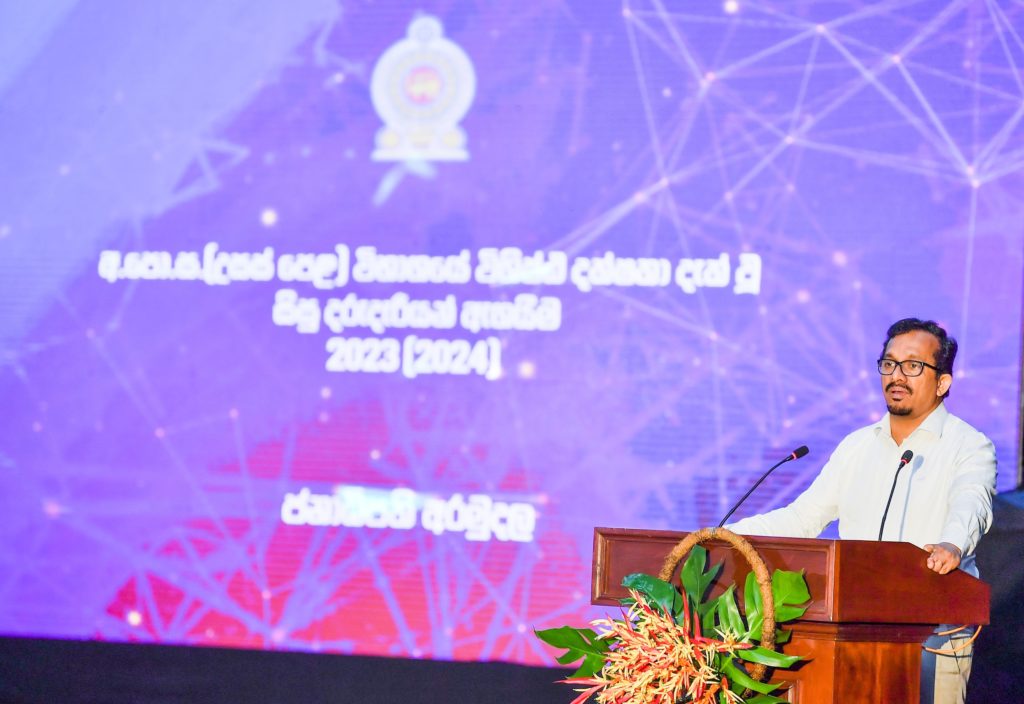
He also stressed that students who advance through the free education system with the help of these scholarships have a responsibility. Minister Handunnetti reminded them, as future leaders, to fulfil their duties to the country and its citizens without fail. He urged them to commit to not engaging in theft or fraud against the country or its people, especially after benefiting from public tax money for their education.
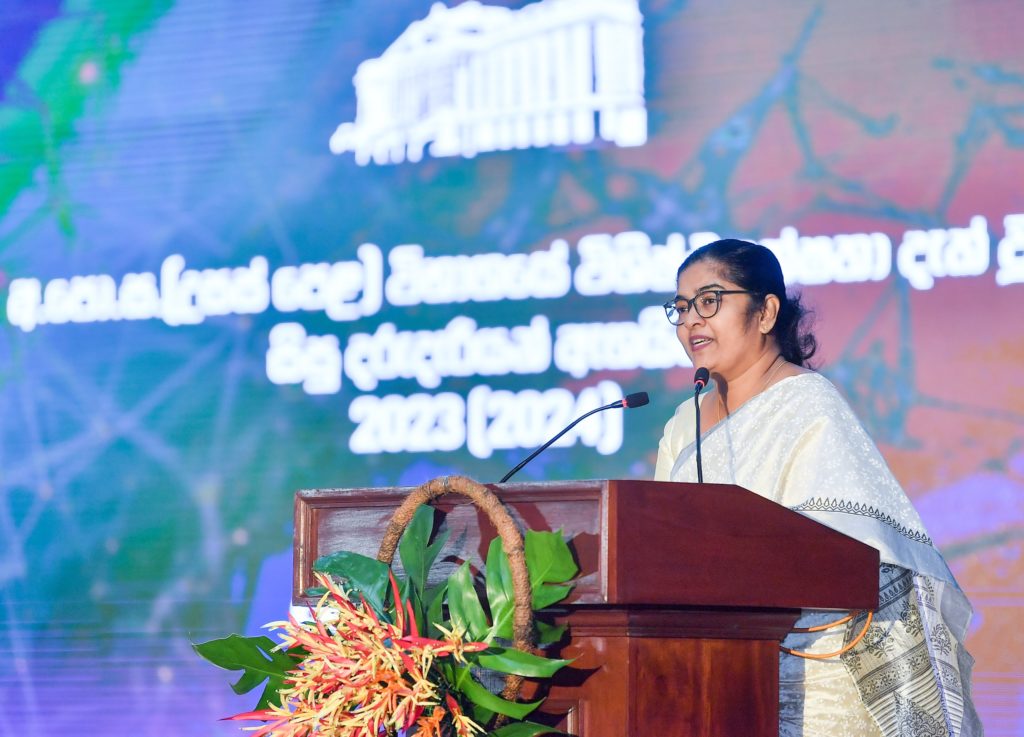
Mrs. Saroja Savithri Paulraj, Minister of Women and Child Affairs, expressed that providing children with the “wings of education” to explore the world is a key priority for the current government and that education can foster humane citizens.
The Minister stated that education was a central focus of the current government’s election campaign, and the President is actively working towards this. She added that the President’s Fund has started providing scholarships to academically gifted children, reflecting the government’s aspiration to empower children through education.
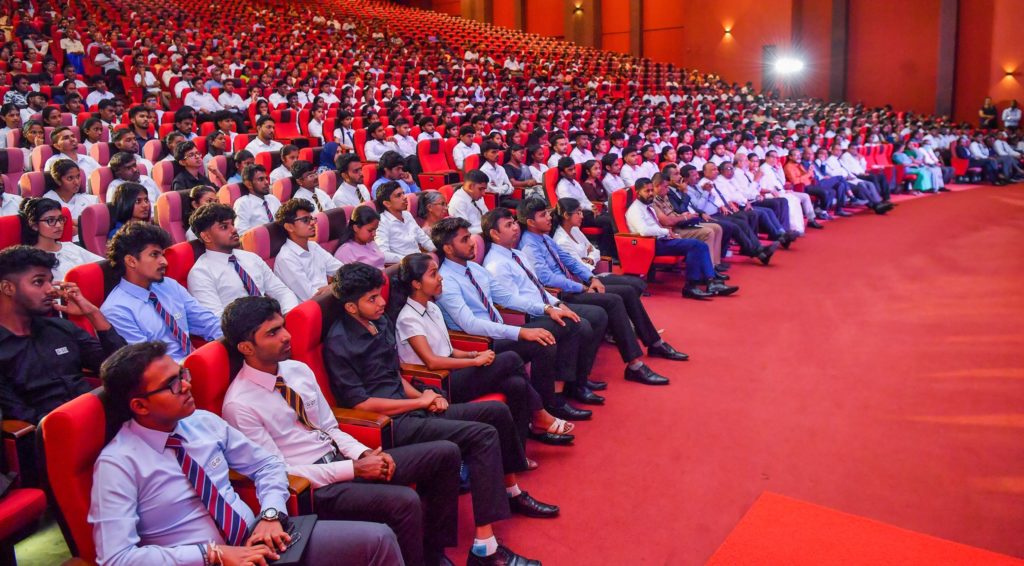
Mrs. Paulraj further pointed out that many of the attendees at the event would likely occupy significant positions in Sri Lanka or globally. She cautioned that if they do not become humane citizens, the substantial investment in their education would not yield its full benefits.
Miss Sithmini Madanayake, a student from Southlands College, Galle, delivered the vote of thanks. She stated that this programme presents a valuable opportunity for economically disadvantaged students to successfully pursue higher education and achieve success in life. She expressed immense gratitude to the President and the President’s Fund for this initiative.
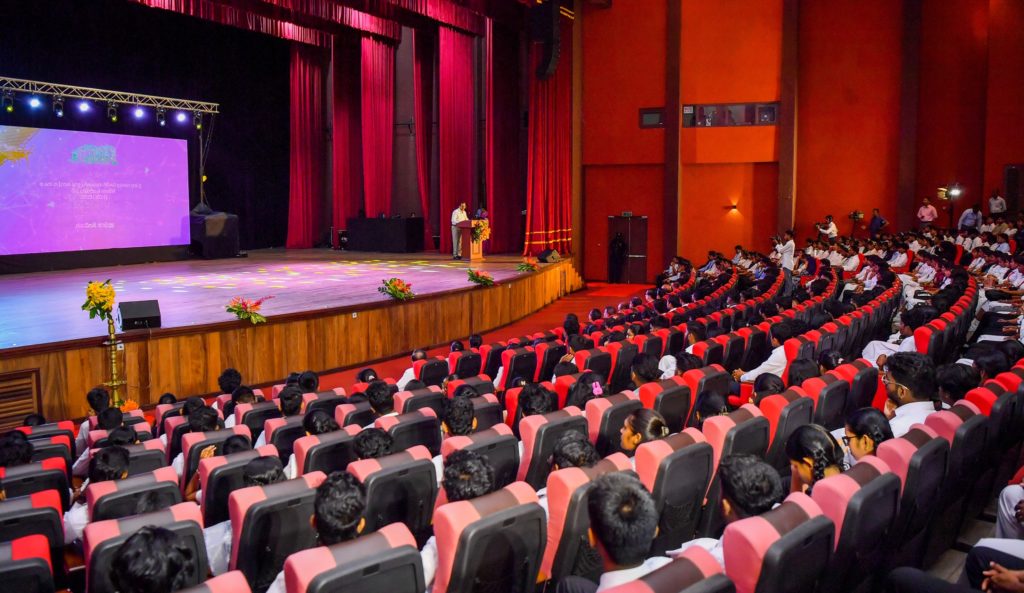
Among those present were Members of Parliament L.M. Abeywickrama, Lal Premnath and Aravinda Senarath; Roshan Gamage, Senior Additional Secretary to the President and Secretary of the President’s Fund; Senior Professor P.A. Jayantha, Vice-Chancellor of Ruhunu University; Chandana Tilakaratne, District Secretary of Matara; W.A. Dharmasiri, District Secretary of Galle; and Bimal Silva, District Secretary of Hambantota. Also in attendance were senior officials from the President’s Fund, government officials, heads of security forces, parents and students.
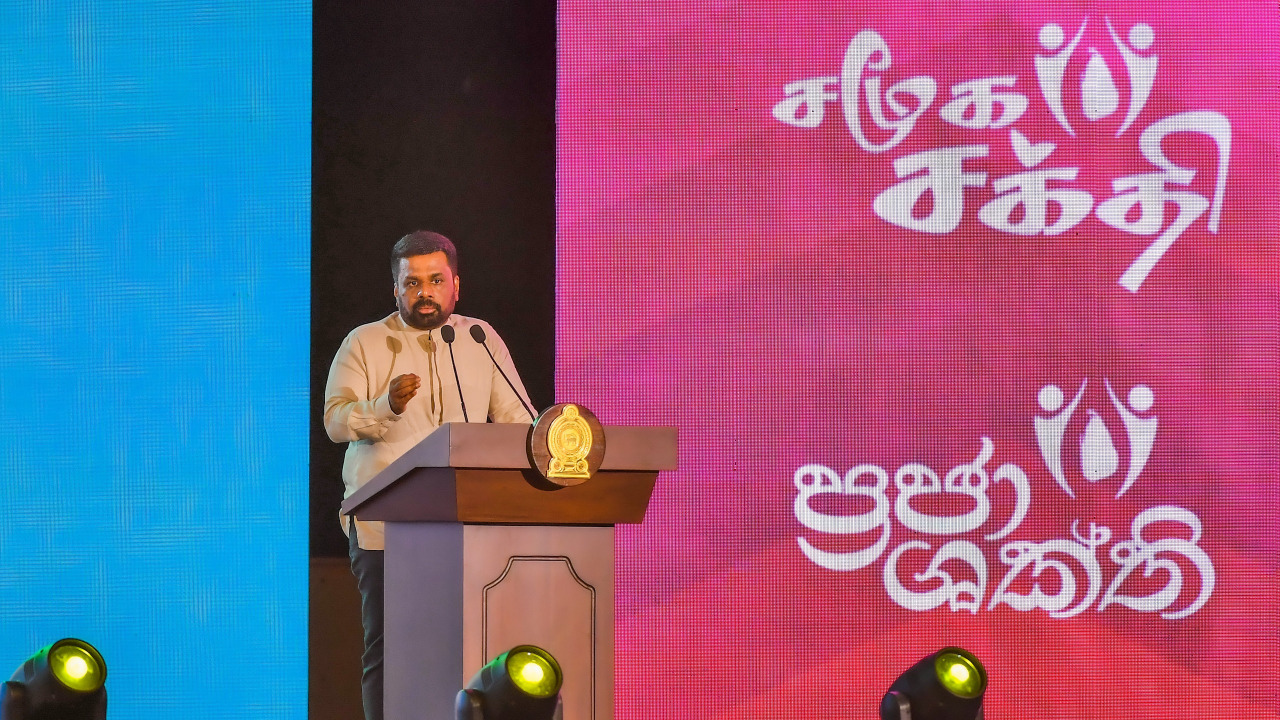
(-2025.07.04 – Colombo-) • Rural communities must be empowered with economic opportunities and recognized as stakeholders in the economy. • The objective of the “Prajashakthi” initiative is to integrate the state mechanism, public officials and citizens into a unified system. – President President Anura Kumara Dissanayake emphasized that no matter the extent of economic growth […]
(-2025.07.04 – Colombo-)
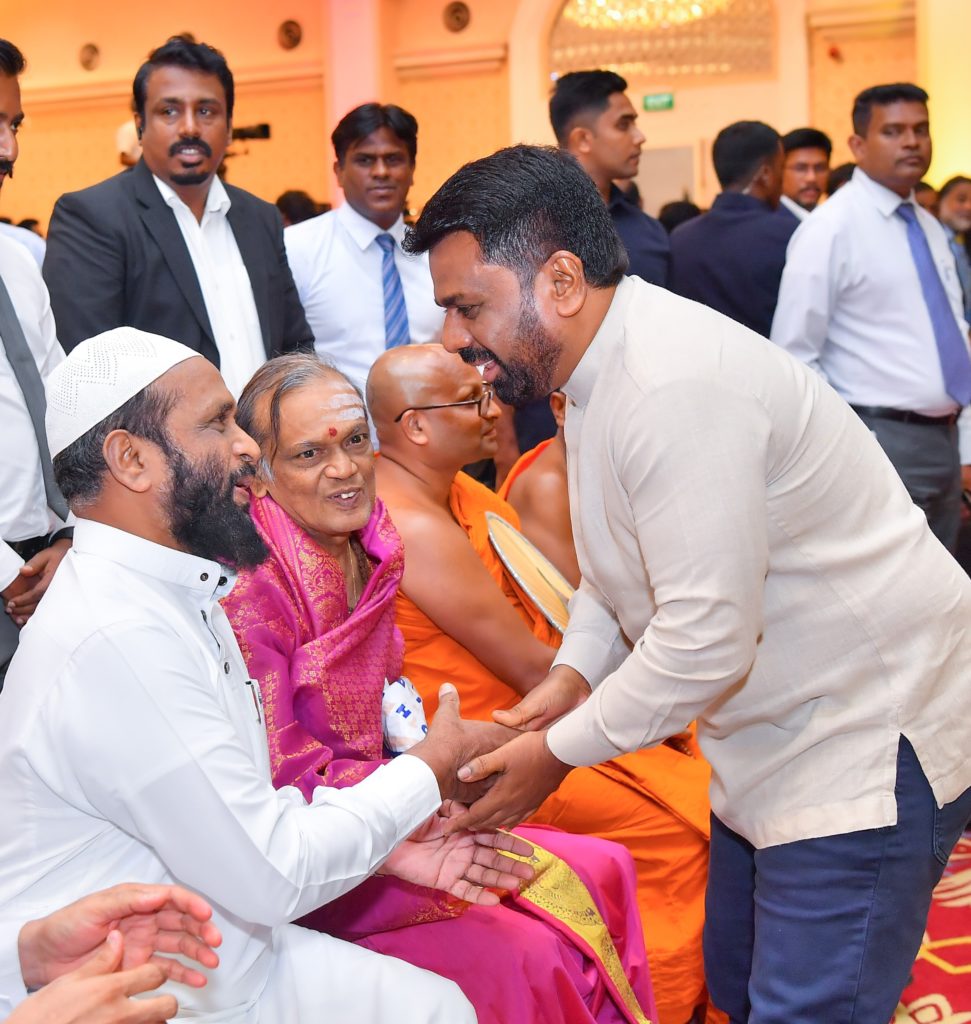
• Rural communities must be empowered with economic opportunities and recognized as stakeholders in the economy.
• The objective of the “Prajashakthi” initiative is to integrate the state mechanism, public officials and citizens into a unified system.
– President
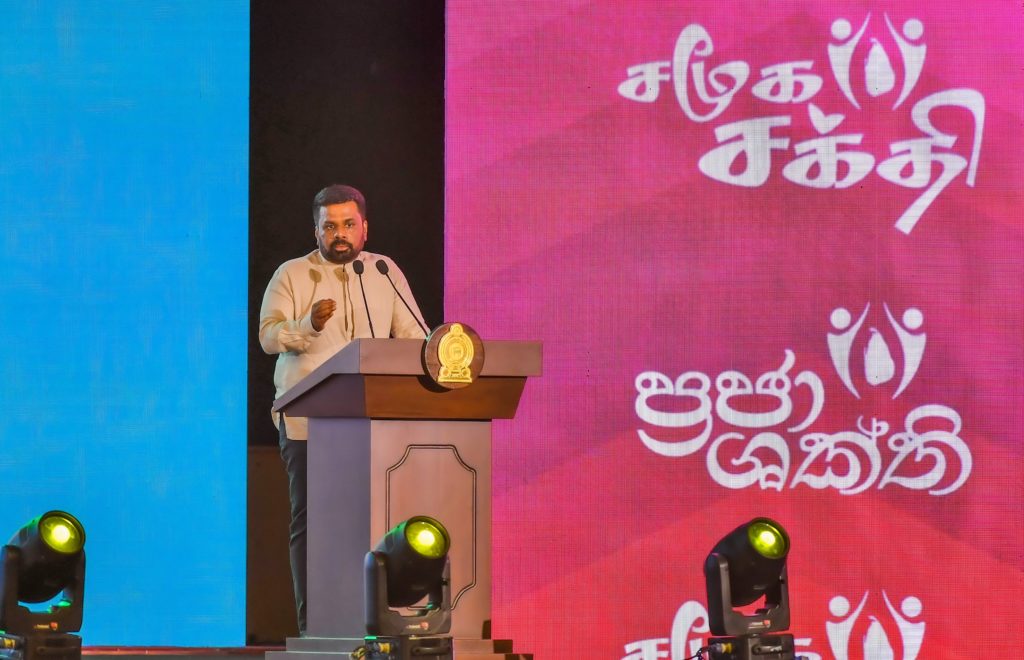
President Anura Kumara Dissanayake emphasized that no matter the extent of economic growth reflected in statistics, if the advantages of this growth do not extend to the rural communities, then such growth holds no significance. The President further stated that while it is important to achieve national economic growth, it is equally essential to expand the economy in a way that creates opportunities for rural communities and makes them active participants in the economic process. He stated that this is a responsibility of the government.
The President made these remarks today (04) attending the launch of the “Prajashakthi” National Programme held at Temple Trees.
The “Prajashakthi” National Programme has been launched as a key initiative of the current government, aiming to empower communities and ensure the fair distribution of economic benefits across society.
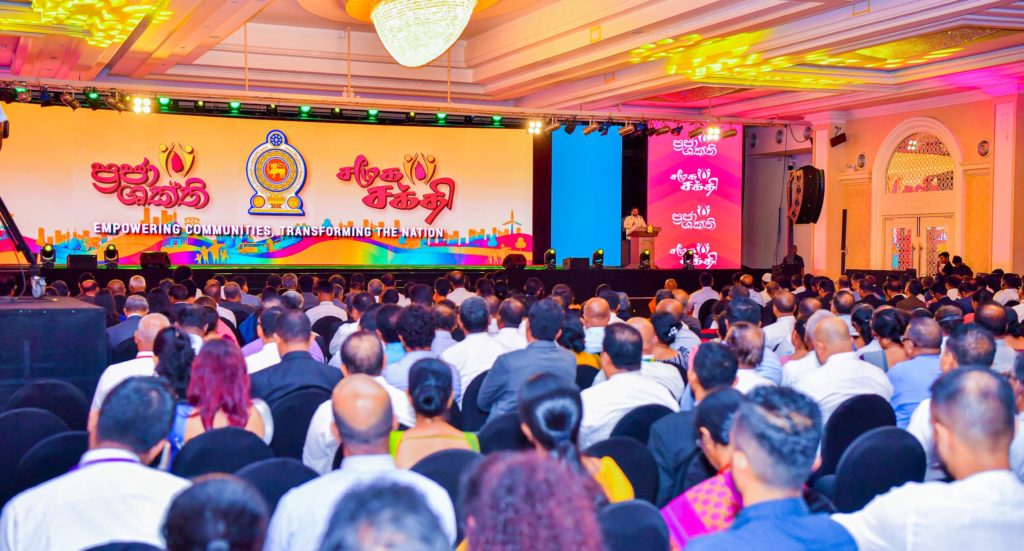
The Secretary to the Ministry of Rural Development, Social Security and Community Empowerment, Mr. Sampath Manthrinayake, welcomed participants to the programme. The Secretary to the President, Dr. Nandika Sanath Kumanayake outlined the objectives of the initiative.
Following this, the Chairman of the “Prajashakthi” National Operations Committee and Minister of Rural Development, Social Security and Community Empowerment, Dr. Upali Pannilage, introduced the national movement.
The official “Prajashakthi” website was also launched by President Anura Kumara Disanayake during the event.
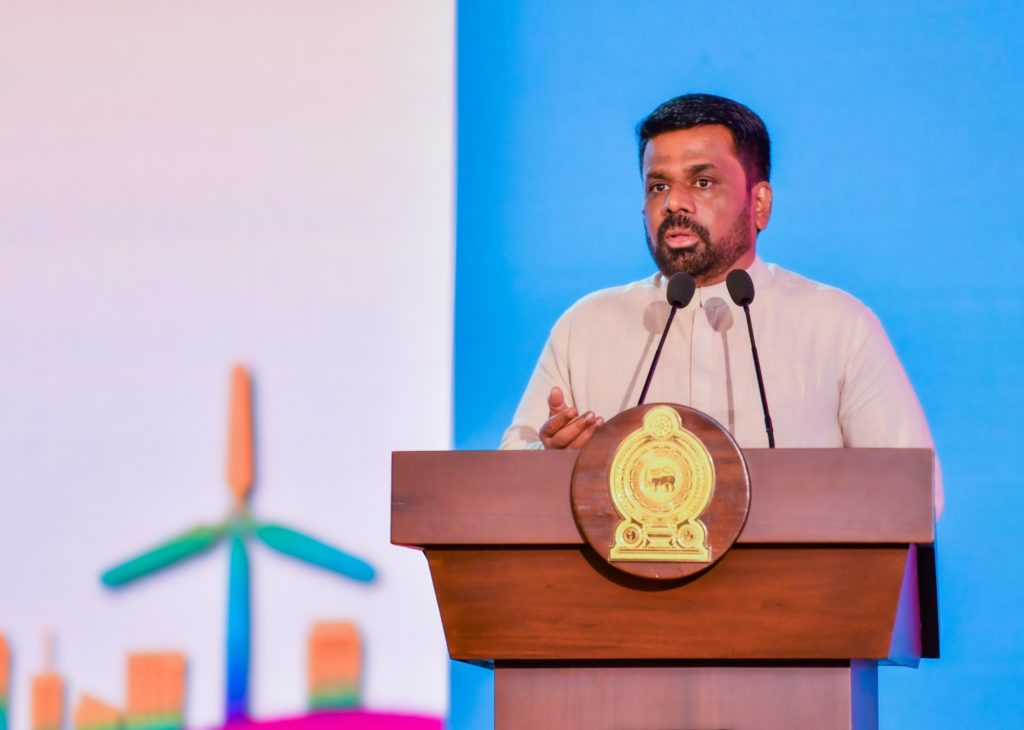
The Full Text of the Speech delivered by President Anura Kumara Disanayake:
A few years ago, our country experienced a severe economic collapse. While there were various contributing factors to this collapse, we must not forget that ordinary people in rural areas, who played no part in its cause, endured the greatest hardships.
They were affected in areas such as food affordability, access to quality healthcare, educational opportunities and the development of rural infrastructure. Therefore, the present government has both a responsibility and a challenge to uplift rural lives. This is a duty that cannot be abandoned.
One of the top priorities of our government is to eradicate rural poverty as a key step towards national progress.
Today, we have managed to bring the economy to a relatively stable state. We have maintained the dollar’s value close to Rs. 300, steadily raised foreign reserves, directed treasury revenue to meet our goals and reduced interest rates to single digits. These are notable indicators of economic stability. We have also been able to gradually restore investor confidence in the country.
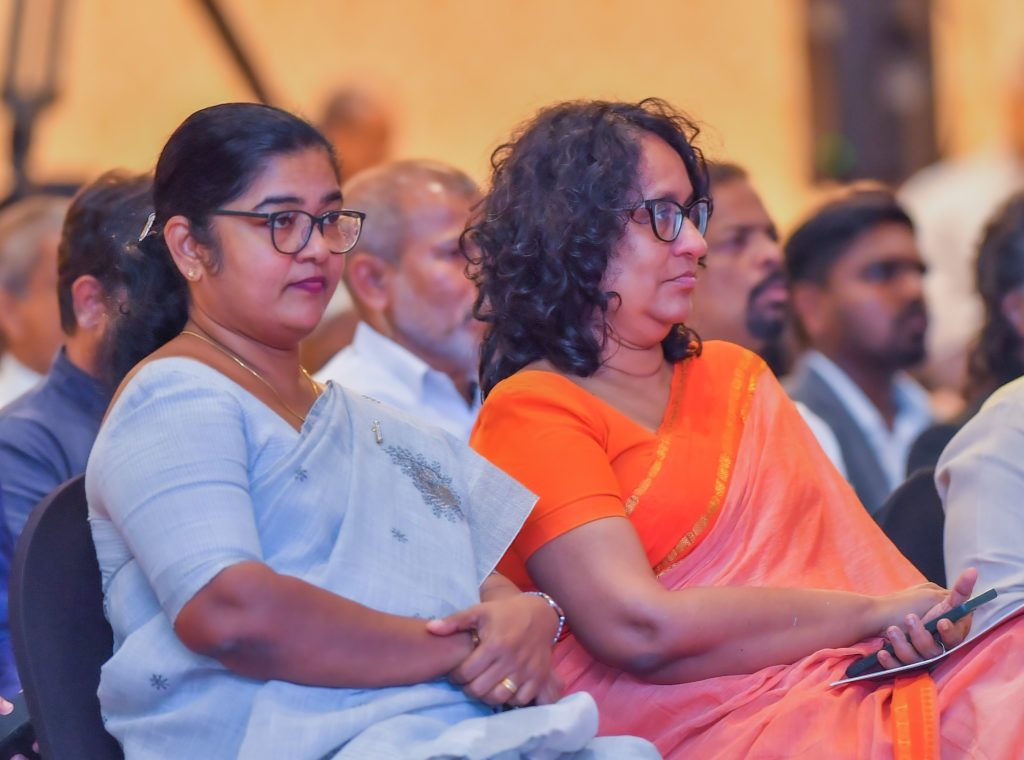
Numerous stalled projects have been successfully renegotiated and restarted. In addition, we have received a substantial number of proposals for new investment projects, many of which were approved at the recent Cabinet meeting. Therefore, our focus is now on new investments and development projects. Through these effective and results-driven investments, we can simultaneously achieve economic stability and economic growth.
However, if these economic benefits do not flow to the rural population, then even achieving growth in statistical terms is insufficient. This is why we must pursue economic growth on one hand and economic expansion on the other. If rural people are not given economic opportunities and included as stakeholders in the economy, they will become marginalised. Our core approach must therefore be to expand the economy and integrate rural communities into it.
This is possible only if the current rural economic activities are transformed into more productive, efficient and profitable ventures. These sectors should be developed to become thriving businesses. Widening their access to economic opportunities is also vital. Hence, we are prioritising the creation of new economic avenues for the rural population, making them active players in the economy.
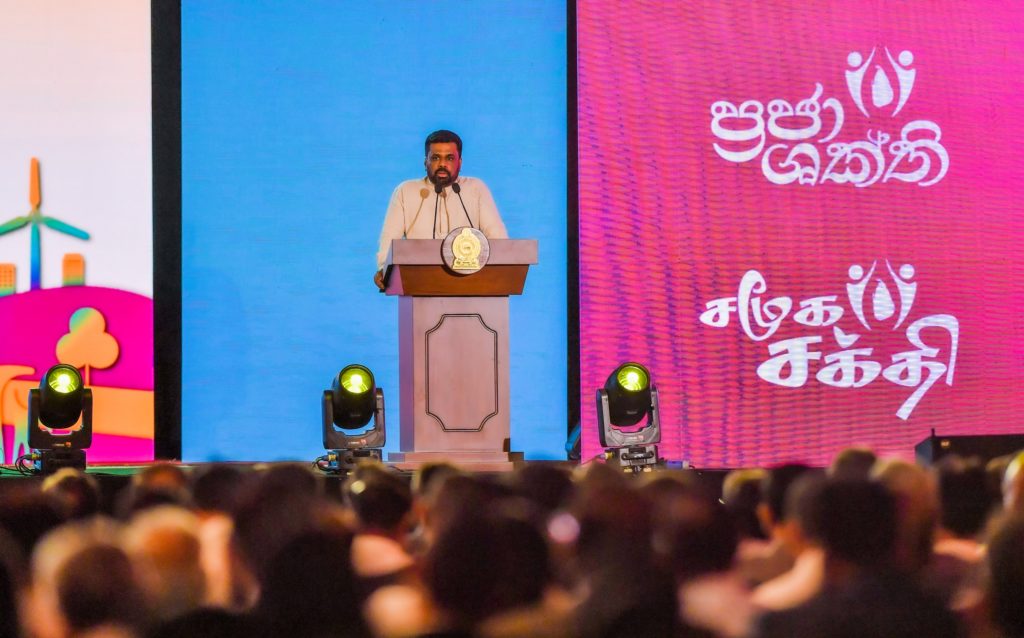
Poverty has gone beyond being an economic issue and become a deep-rooted social problem. Poor communities have become isolated from society. Therefore, eliminating rural poverty is one of the government’s primary responsibilities. Education plays a key role in this. There is a direct correlation between poverty and lack of education. Thus, we must expand educational opportunities further. Despite all efforts, every society has a segment of people who will face difficulties. Even in so-called developed nations, such communities exist. A welfare system is required to support these groups.
Welfare is not inherently a bad tool. If a population is vulnerable at a given time, it is the government’s responsibility to protect them. However, welfare has often been misused, turning into a political tool. This has led to growing criticism of such programmes due to their politicisation.
Our policy under the National People’s Power government is to provide targeted welfare. Assistance must be given to the right people for the right reasons. I believe the government holds this responsibility and society must also understand its importance. In our society, there is a belief that anything given by the state must be received by all. That is a mistaken belief. Our state is not built on such a culture of entitlement. Our culture is to protect those who need protection. Because of distortions in past practices, those who don’t need aid often compete to obtain it, making it harder to support those who truly do.
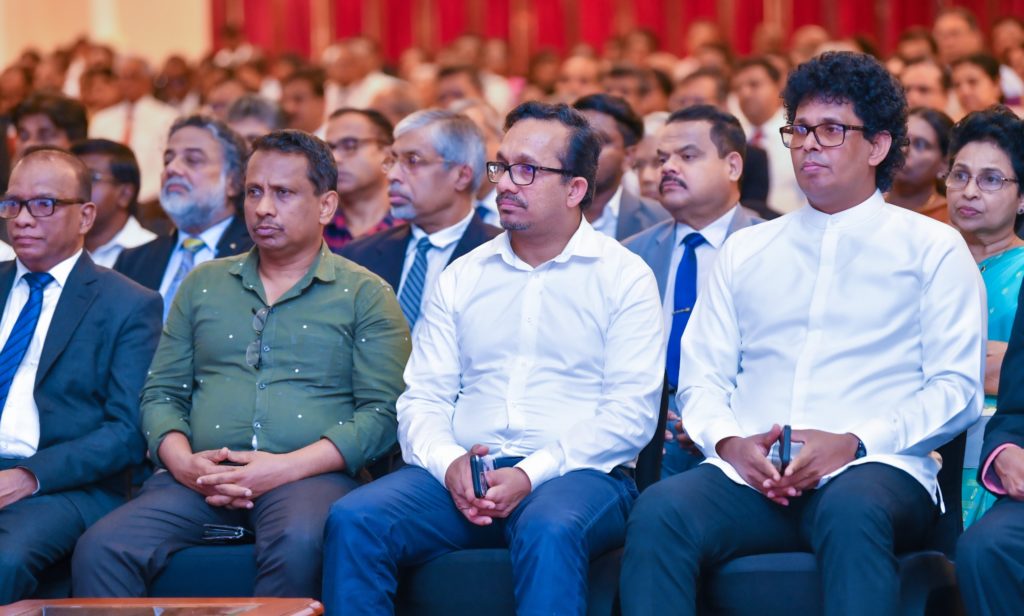
We must therefore foster a new culture. People must be self-aware enough to recognise whether they truly deserve government support. Even if you have the ability, the person next door mat doesn’t have that ability. It is essential to cultivate a sense of responsibility to assist others. But today’s mentality is to claim whatever is available, regardless of whether one needs it or not. This is the reason we strive to create a strong data system, ensuring that support is provided solely to those who truly require it.
However, we all know that a society cannot rely forever on welfare programmes. There will always be a need for welfare systems, but they must not serve the same individuals or communities indefinitely. Others too must be enabled to become contributors to the economy.
Significant government funds have been expended for this purpose. Approximately, Rs. 230 billion has been allocated solely for the ‘Aswesuma’ programme. Large sums of money have also been spent on other aid programmes. However, have these funds reached the targeted communities? Have the intended benefits been realised from these funds? The answer is no.
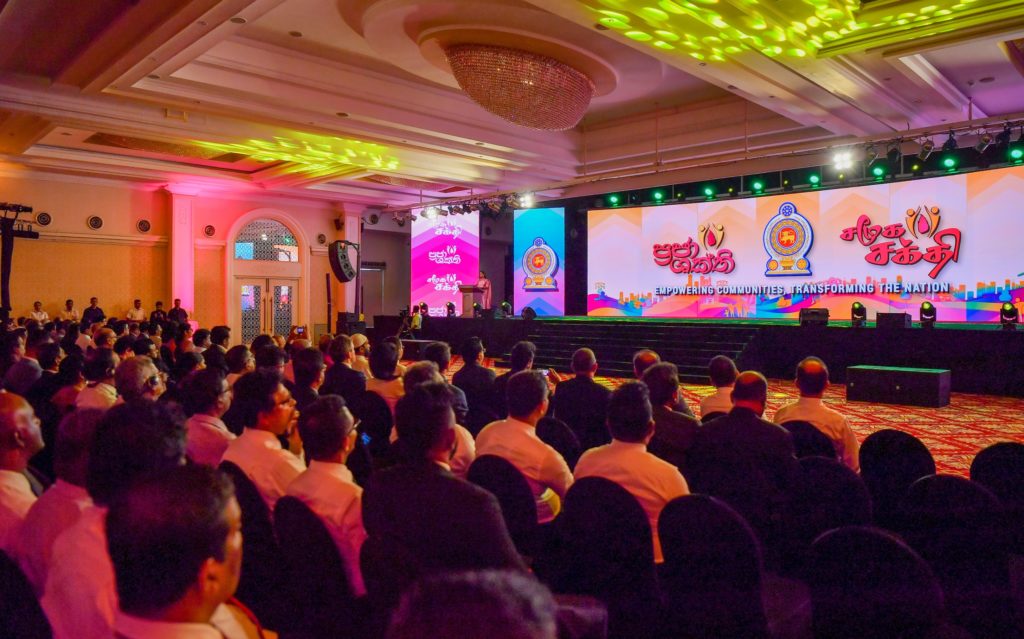
Various international organisations implement aid programmes in this country. Looking at these, more than 50% of the expenditure goes towards establishing the mechanism for delivering the aid. An official waits to see how they can personally benefit from a project once it is received. They have their job, but the project is not within their purview. They then claim that an allowance is required to implement the project. Consequently, a substantial portion of these aid funds is spent on the aid delivery mechanism rather than reaching the intended beneficiaries. Furthermore, a significant amount has been spent on training within this mechanism. These practices must cease. As a government and as state officials, you have a responsibility to ensure that aid reaches the targeted communities.
We assure you that we will absolutely not allow any misuse of these funds. An operation must be launched to ensure that aid reaches those who are deserving.
Similarly, there is a tendency for every Ministry to believe they must provide something. However, based on a very accurate data system, it should be determined what should be provided and for what purpose. But what is happening now is not in that manner. Every institution and department is inclined to provide aid. Yet, all aid flowing to rural communities and programmes aimed at empowering their economies must be integrated. A large portion of our aid has been provided merely for subsistence. It has not succeeded in improving the living standards of these people. That is why an integrated operation is necessary. We are launching the ‘Prajashakthi’ programme as that operation. It is a targeted operation. The programme must be structured down to the Divisional Secretariat level.
Currently, a significant administrative structure has been built. I do not believe a child will be born without a birth certificate anymore. When they reach the appropriate age, they obtain an identity card. In the next two years, we will move towards a digitisation mechanism. So, what is the responsibility of the lowest administrative unit in this mechanism? The responsibility of the lower administrative unit is to understand the nature of its unit and to create a plan to advance that unit based on its characteristics. We must advance the Divisional Secretariat from this point onwards. A programme should be prepared for that. There is a need to spend money there and we are prepared for it.
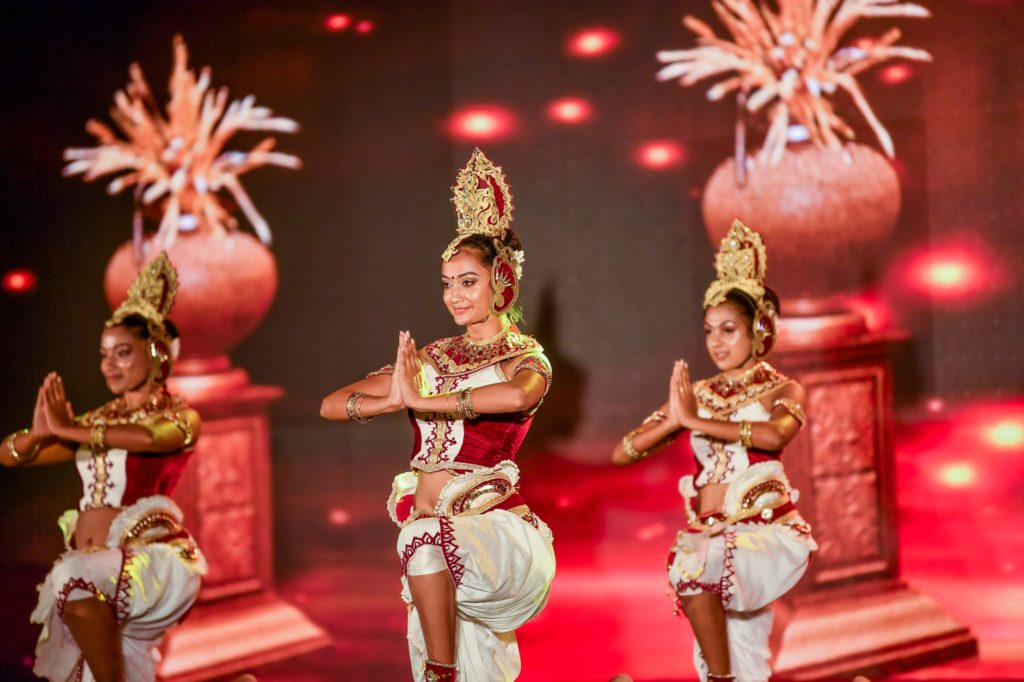
I also acknowledge that our state mechanism is largely dilapidated. If you consider all the vehicles owned by state officials, they are all more than 15 years old. More than 50% of the buses on the road are vehicles unfit for road use. The computers in offices are significantly outdated. The systems in our institutions have not been updated. Buildings are deteriorating. From every angle, we have a dilapidated state mechanism. We come to the office like ordinary villagers. That is the honest truth. In the last budget, salaries were increased and necessary support was provided to human resources.
Therefore, in the upcoming budget, we will work to build the physical resources of the state mechanism. Relative to building physical resources, we will introduce new software systems and modernise the state mechanism. However, this is for the benefit of the citizens. If, within that modernised state, the same old person is sitting in the old chair, there is no benefit. Therefore, within this modernised state mechanism, we need a new public servant.
This is the only way we can overcome this challenge. Otherwise, if we scatter, thinking this is a political task, a job for the political authority, or for the Grama Niladhari , the Development Officer, or the Divisional Secretary, it cannot be achieved. To do this, an unyielding, integrated operation involving both the political authority and the state mechanism is required. The objective of the ‘Prajashakthi’ programme is to bring together the state mechanism, state officials and citizens into an integrated framework. Without this, nothing can be accomplished. Our aim is not merely to maintain the existing state; if that were the case, the current situation would suffice.
To rebuild a fallen state, the political authority, the state mechanism and the citizens must be brought together into an integrated operation. Therefore, there is a community that has lost economic opportunities in this fallen state. An integrated operation is needed to create economic opportunities for that community. I urge all of us to work together to make this ‘Prajashakthi’ project a success.
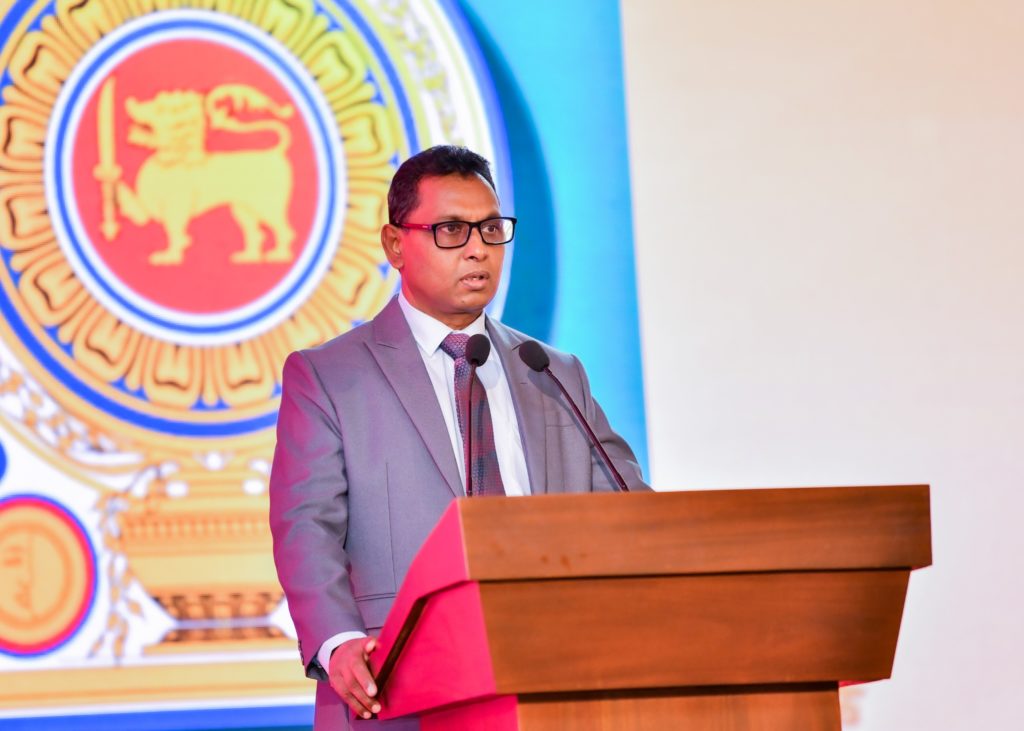
– Dr. Upali Pannilage, Convenor of the ‘Prajashakthi’ National Policy Council and Chairman of the National Operations Committee, Minister of Rural Development, Social Security and Community empowerment –
When discussing poverty in our country, the village holds a special place. Not only in Sri Lanka, but internationally, especially when looking at Asia, Africa and Latin American regions, we cannot discuss poverty by forgetting the village. That is why the United Nations declared July 6th as World Rural Development Day.
Although rural poverty in our country has been a subject of discussion for decades, various attempts have been made to change it. However, for example, looking at the statistics for the year 2000, 1.1 million people in our country were dependent on aid. By 2010, this number had increased to 1.5 million. By the end of 2024, the number of people dependent on aid had reached close to 1.8 million.
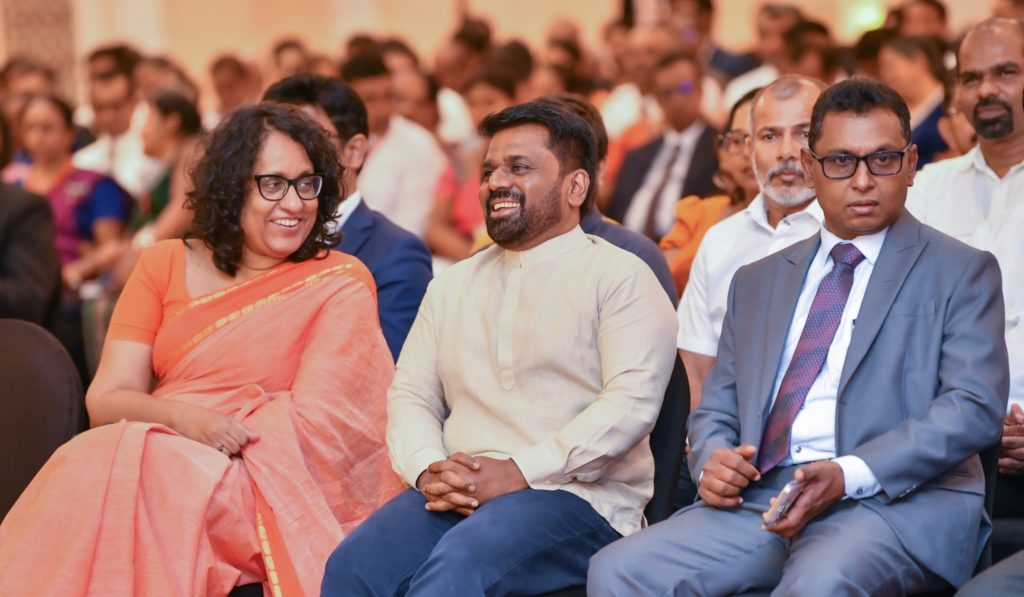
These statistics confirm that despite numerous programmes implemented to eradicate poverty, the impoverished community in our country is growing steadily. Although the world’s population is rapidly urbanising, nearly 79% of our country’s total population lives in rural or estate areas. Therefore, as the National People’s Power government, when planning our policies, we made the eradication of rural poverty a central theme.
Before launching this programme, we thoroughly studied the weaknesses of the poverty eradication programmes implemented in our country. We designed this programme by addressing those weaknesses and providing answers to the question: How can we truly eradicate poverty in our country? Primarily, we expect to achieve several objectives through this programme.
Prime Minister Dr. Harini Amarasuriya; Sunil Handunnetti, Minister of Industry and Entrepreneurship Development; Wasantha Samarasinghe, Minister of Trade, Commerce, Food Security and Cooperative Development; Professor Chandana Abeyratne, Minister of Public Administration, Provincial Councils and Local Government; Samantha Viddyarathna, Minister of Plantation and Community Infrastructure; Saroja Paulraj, Minister of Women and Child Affairs; Mahinda Jayasinghe, Deputy Minister of Labour; along with other Ministers and MPs; Dr. Nandalal Weerasinghe, Governor of the Central Bank; Provincial Governors; Ministry Secretaries; state officials; and representatives from international organisations were among those who attended the occasion.
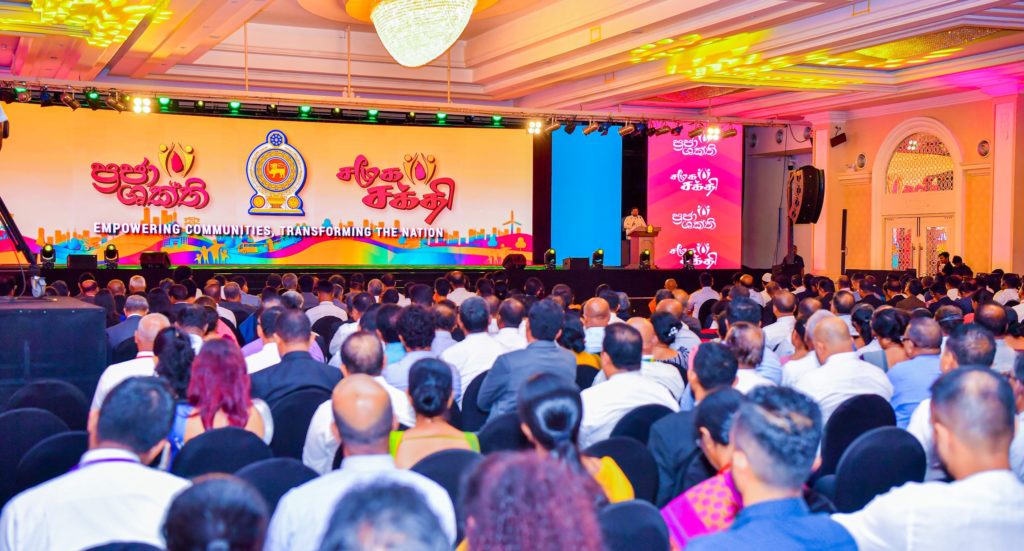
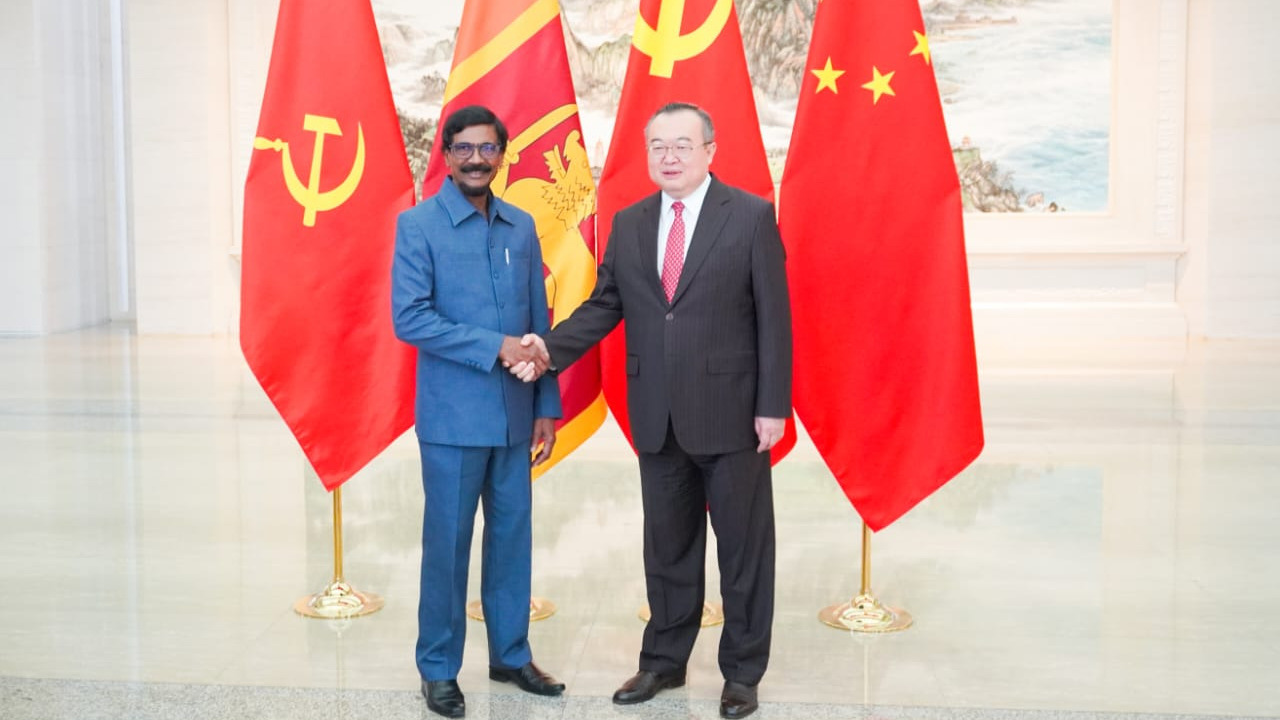
(-2025.06.17 – China-) At the invitation of the Communist Party of China, Tilvin Silva, General Secretary of the JVP, who has been frequently visiting China recently, discussed with Liu Jianchao, Head of the Foreign Affairs Department of the Communist Party of China, along with its high-ranking leaders. Liu Jianchao emphasised that no one can damage […]
(-2025.06.17 – China-)
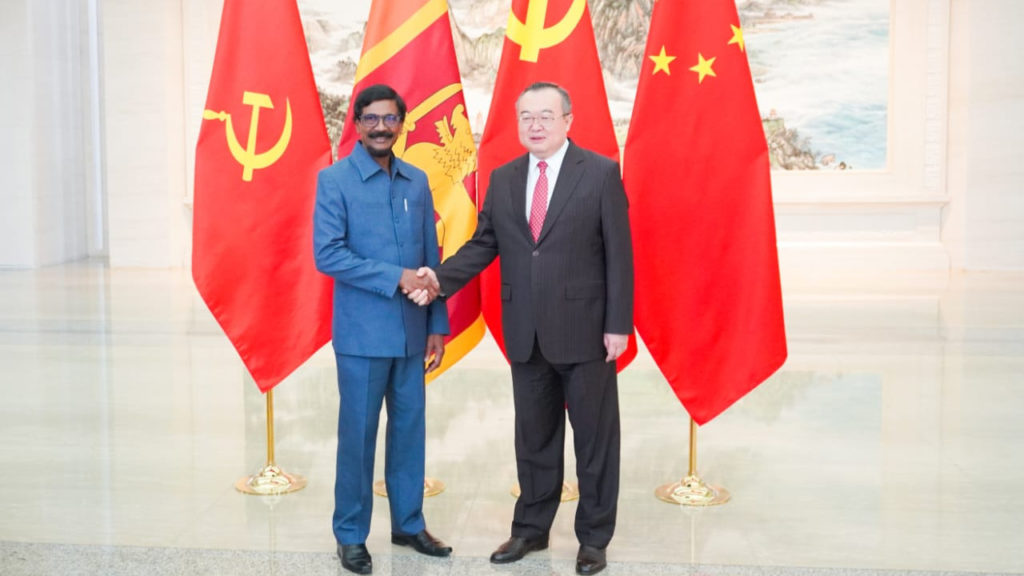
At the invitation of the Communist Party of China, Tilvin Silva, General Secretary of the JVP, who has been frequently visiting China recently, discussed with Liu Jianchao, Head of the Foreign Affairs Department of the Communist Party of China, along with its high-ranking leaders.
Liu Jianchao emphasised that no one can damage the long-standing friendship between the JVP and the Communist Party of China and that no one will be allowed to damage that friendship.
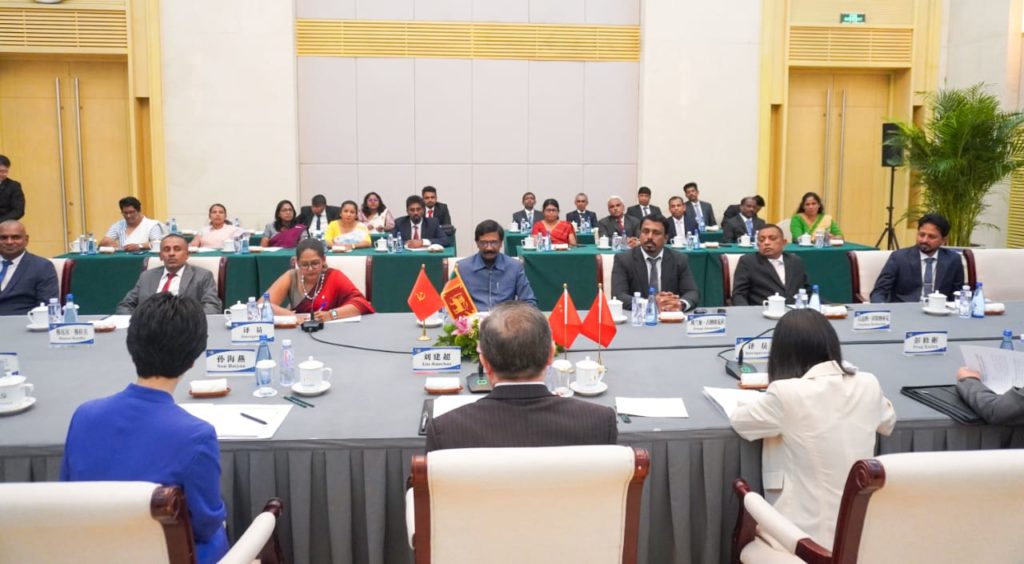
Liu Jianchao stated that China is ready to assist with the country’s development program at any time and that China is not ready to take measures that undermine the sovereignty of any country.
At that time, JVP General Secretary Tilvin Silva stated that the friendship between China and Sri Lanka and between the JVP and the Communist Party of China had further developed during the visit of JVP leader and President Anura Kumara Dissanayake earlier this year. He also emphasised that this friendship would further develop during the visit he and his group are making.
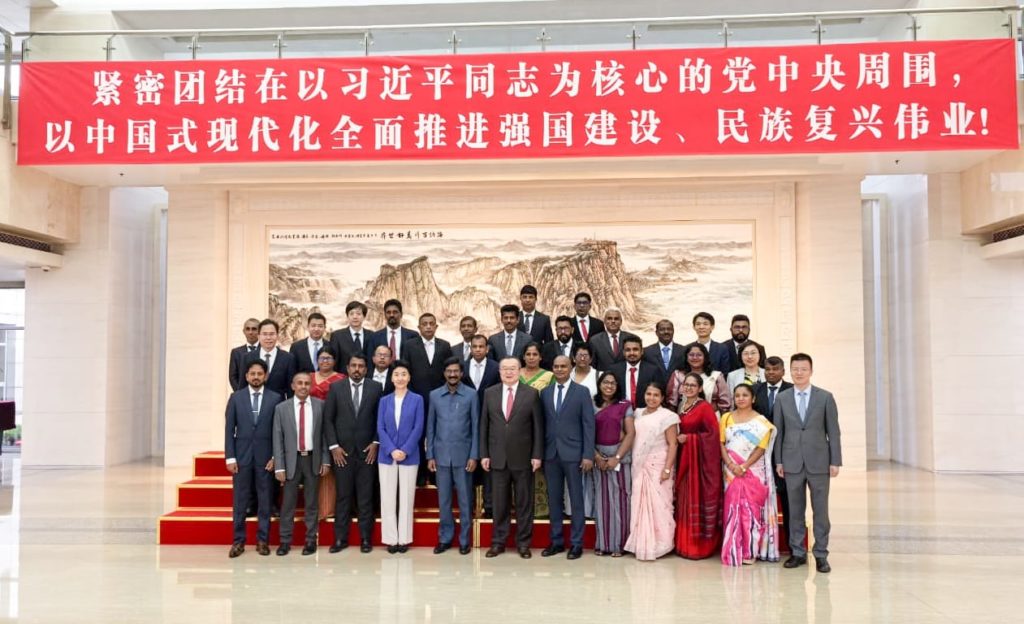
He also stated that they will act by the understandings reached between China and Sri Lanka and that they are grateful for the support China is providing to Sri Lanka and look forward to that support in the future.
During this visit to China, he expressed his satisfaction with the way China has been working to build China, from former leader Chairman Mao Zedong to Xi Jinping, and stated that it is a victory for the Communist Party of China that China is advancing Marxism in its unique way.
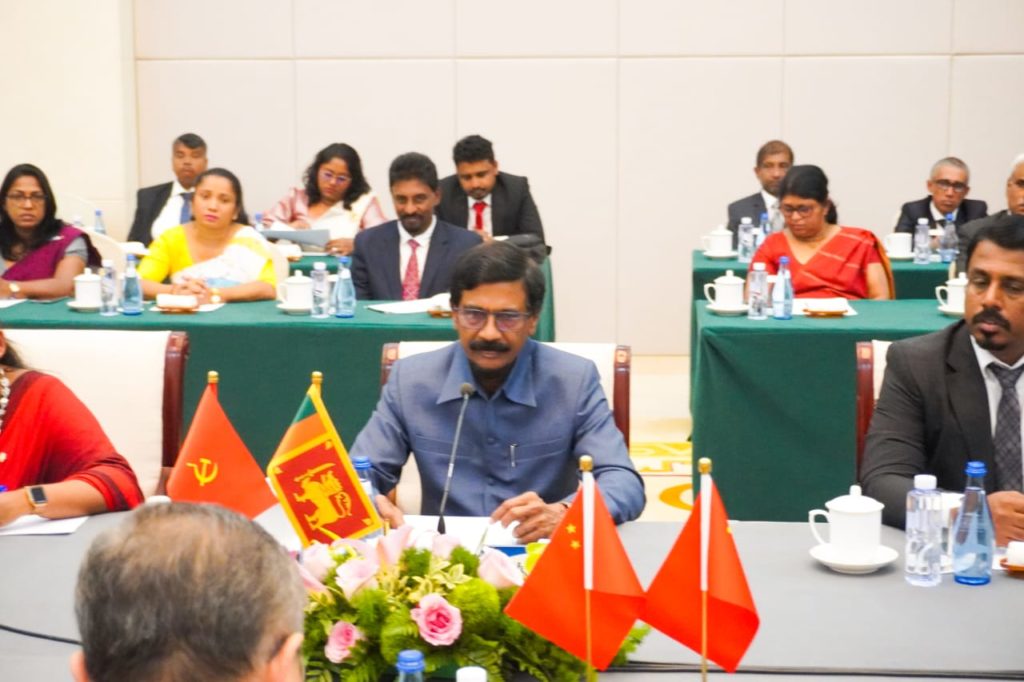
During this visit, the experiences gained through the studies conducted through the party schools and the way the village has been built can greatly contribute to the future development of Sri Lanka, emphasised Tilvin Silva, General Secretary of the Janatha Vimukthi Peramuna.
The meeting was attended by Sun Haiyan, Deputy Head of the Foreign Affairs Department of the Communist Party of China, and a group from the Foreign Affairs Department of the Communist Party of China, while the Janatha Vimukthi Peramuna was represented by Deputy Minister of Youth Affairs Eranga Gunasekara, Deputy Minister of National Integration Munir Mulaffar, Jaffna District Parliamentarian A.M. Jegadeswaran, Matale District Parliamentarian Deepthi Wasalage, and Gampaha District Parliamentarian Dharmapriya Wijesinghe.
